Home Explore France Official Tourism Board Website
- Explore the map

Entry Requirements for American Travelers to France
Inspiration

Reading time: 0 min Published on 4 January 2023
PASSPORTS AND VISAS
All U.S. and Canadian citizens, including infants, need a valid passport to enter France. Visas are not required for American and Canadian visitors staying in France for up to 90 days. For more information, contact your nearest French Consulate. See a list of local French consulates in the U.S.
It is mandatory in France to carry some form of identification at all times. If you lose your passport, the nearest U.S. Consulate will issue Americans a limited-validity replacement if travel is imminent, or a full-validity passport if further travel is not within two weeks. When in France, please carry a photocopy of your passport separately from your passport. The copy will facilitate issuance of a replacement ($75 fee for adults, $85 for children). The American Embassy in Paris is at 2, avenue Gabriel, tel. 01 43 12 22 22. The Passport Section is nearby at 4, avenue Gabriel (open 9a.m.-noon, Monday- Friday). There are other Consular Offices in Bordeaux, Lille, Lyon, Marseille, Nice, Rennes, Strasbourg and Toulouse that provide assistance to American citizens.
Entering France : Travelers from countries outside the European Union (EU) must declare certain articles when entering France. Duty and import taxes are levied on items not for personal use that individually or collectively exceed 175€ in value. Certain categories of items for personal use (tobacco products, alcoholic beverages, perfumes, coffee and tea, etc.) may be brought in untaxed up to certain authorized amounts. The following are forbidden or subject to strict control: drugs, radioactive materials, firearms, endangered species, plants, ivory and food, meat and dairy products. Carry prescriptions to authenticate any controlled substances. “Monetary instruments” equal to more than 10,000€ (whether brought into or taken out of France) must be declared. When in doubt, consult the French Embassy , a French Consulate or the French Customs and Excise Service's “ Info Douanes Service ” in Paris at tel. 08 20 02 44 44 (8:30 a.m.-6:00 p.m., Monday to Friday)
Re-entering the U.S. : Returning U.S. citizens who have been away for 48 hours or more are allowed to bring back, once every 30 days, $800 worth of merchandise duty-free. You're charged a flat rate of duty on the next $1,000 worth of purchases, and any dollar amount beyond that is subject to duty at whatever rates apply. On mailed gifts, the duty-free limit is $200. Have your receipts or purchases handy to expedite the declaration process. Note: If you owe duty, you are required to pay upon your arrival in the United States, using cash, personal check, government or traveler's check, or money order; some locations also accept Visa or MasterCard.
BRINGING YOUR PETS TO FRANCE
Travelers may bring dogs, cats and ferrets into France. Each family is limited to five animals, which must have valid rabies vaccination certificates and be identifiable by a microchip or tattoo. For more information, including details about travel with pet rodents, reptiles, birds or other species, visit www.ambafrance-us.org or contact the French Embassy.
- TWITTER - Follow the Embassy on Twitter

By France.fr
The magazine of the destination unravels an unexpected France that revisits tradition and cultivates creativity. A France far beyond what you can imagine…
Holidays at Galeries Lafayette

Air France, the best and most comfortable way to get to France

French Wine Tasting with Duclot La Cave

Gift vouchers for your shopping at Galeries Lafayette

The Christmas Windows Display and Characters

A Fairy Tale 1, 2, 3 Christmas!

8 Luxurious Boutiques in Paris

A historical and cultural melting pot in French Polynesia
Tahiti-French Polynesia

We’re sorry, this site is currently experiencing technical difficulties. Please try again in a few moments. Exception: request blocked
France ETIAS Requirements for American citizens
From 2025, United States citizens will need to apply for the online ETIAS visa waiver to travel to France and other Schengen countries.
The ETIAS authorisation for France is being introduced to improve European border control and reduce security threats. The ETIAS for France will allow U.S. travellers to spend up to 90 days in any Schengen member state. They must meet the France ETIAS requirements for Americans .
United States citizens can visit France and the other Schengen Area countries visa-free for up to 90 days for business or tourist purposes. However, from 2025, American passport holders will be required to register online for ETIAS.
To be eligible for visa-free travel, US citizens will have to meet the France and ETIAS requirements for Americans .
Do US citizens need a visa for France?
US citizens do not need a visa to travel to France for up to 90 days. American passport holders can go to France for tourism, business, or transit visa-free.
From 2025, US citizens will need to register with ETIAS to travel to France . ETIAS is not a visa, it is a travel authorisation for visa-exempt non-EU citizens, including Americans. ETIAS will make France an even safer travel destination.
Applying for ETIAS is 100% online with no embassy appointments or interviews. The authorisation is electronically linked to the US passport on approval and verified when the travel document is scanned at the US border.

US citizens need a visa for France to stay longer than 90 days or for purposes other than tourism, business, or transit. Travellers should check France’s visa requirements for US citizens for more information about work and study visas.
ETIAS France requirements from the United States

Travellers must meet France’s ETIAS requirements for United States citizens to be eligible for visa-free entry.
American passport holders must:
- Stay in the Schengen Area for no more than 90 days per 180-day period
- Visit France for tourism, business, or transit purposes
- Meet the safety and security requirements
US citizens need a visa for France if they do not meet these ETIAS requirements . ETIAS France applications are cross-checked against safety and security databases. Applicants who present a security threat will not be granted ETIAS.
US passport requirements to apply for ETIAS France
Travellers must hold a US passport with over 3 months of validity remaining from the intended date of departure from France to apply for ETIAS France. Applicants need to provide their passport number, issue date, and expiry date.
The ETIAS authorisation is only valid with the passport used to apply. The travel authorisation is linked to the passport number and cannot be transferred.
If the US passport expires before the ETIAS permit (3 years) a new application must be submitted.
ETIAS France application from the United States
To get the France visa waiver, eligible passport holders will need to fill out the ETIAS France application form online .
In addition to the requirements stated above, a valid credit/debit card will be needed to pay the travel authorisation for France fee. Applicants will also need to provide a current email address to receive the France ETIAS permit via email.
The information American ETIAS applicants need to provide includes :
- Contact details
- Passport number, issues, and expiry date
- Date and place of birth
- Travel information
It is important to double-check all the data entered to avoid processing delays or rejection of the ETIAS application for France.
Applicants pay the ETIAS France fees for US citizens securely online by debit or credit card to finalise the request.
Documents and entry requirements for US citizens to France
Americans need the following documents to travel to France :
- Valid US passport
- ETIAS authorisation (from 2025)
France requires a visa for US citizens if they are not eligible for ETIAS. The same ETIAS can be used to visit France and the rest of the Schengen Area. The total stay in the Schengen Area must not exceed 90 days per 180-day period.
Note that an approved ETIAS of visa does not guarantee entry to the Schengen Area.
Medical requirements for Americans travelling to France
United States citizens travelling to France do not require any specific vaccine to enter the country, but should be up-to-date with all recommended vaccinations before travelling to France.
It is also recommended to get medical insurance that provides coverage in France, as US Medicare does not apply overseas.
Travellers must pay for medical services before receiving treatment, with the exception of emergency services. It is possible to fill in a “Feuille de Soins” (treatment form) for later reimbursement from insurance. Those unable to pay for medical treatment in France may be refused treatment.
Travellers who require prescription medication are advised to check its legality in France, and to carry the medication in the original, clearly labelled packaging alongside the prescription. Emergency medical services in France can be reached by dialling 15 or 122 to connect to an operator.
FAQs for Americans travelling to France:
Do you need a visa to go to paris as a us national.
No, you do not need a visa for short trips to Paris or elsewhere in France , but you will need an ETIAS authorisation in the near future.
What are the medical requirements for Americans travelling to France?
Currently, there are no specific medical requirements for US nationals travelling to France . It is advised to be up-to-date with routine vaccinations.
It's wise to stay informed about any travel advisories or vaccine recommendations.
How long can Americans stay in France with the ETIAS?
With an ETIAS authorisation, Americans can stay in France and the wider Schengen Area for up to 90 days within any 180-day period .
Can US citizens visit other European countries with the ETIAS?
Yes, the ETIAS authorisation allows American citizens to travel freely within the Schengen Area . This includes most European countries — 29 out of 44.
By familiarising yourself with the ETIAS requirements, you can ensure a smooth and enjoyable travel experience to France and beyond.
Why do Americans suddenly need the ETIAS?
The Schengen Area is launching the ETIAS for all visa-exempt travellers , including citizens of the United States. As part of Schengen, France will have ETIAS as an entry requirement.
The ETIAS platform is designed to improve security for the region. ETIAS France applications will be cross-checked against safety and security databases. Applicants who present a security threat will not be granted ETIAS.
This will make visits to France from the US safer than ever before — a huge benefit for a simple form that can be completed in minutes.
It will also preserve visa-free travel to Europe for American citizens .

- Rr. Skenderbej 14, 1000 Tirana, Albania
- (+355) 42 38 9700

- 57, Avenue Marceau, 75116 Paris, France
- (+33) 1 4723 3100
- [email protected]
Jump to navigation

September 10 update on entry requirements for U.S. Citizens & Residents
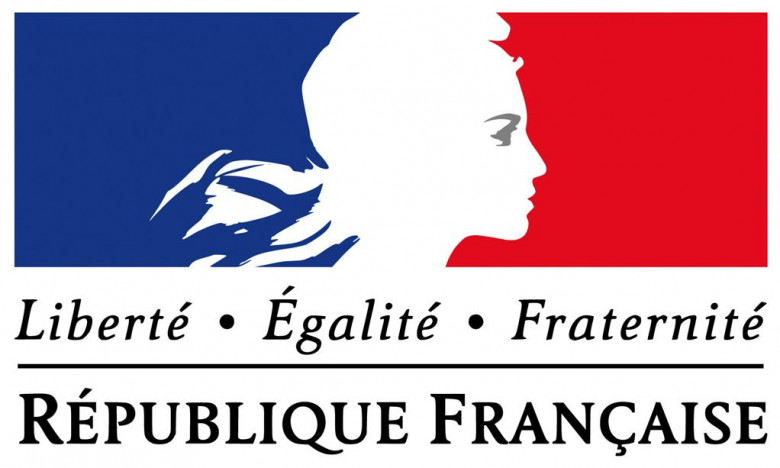
September 10 update on entry requirements for U.S. residents
The French Government announced today that the United States has been placed on the Orange List* (or Amber list) of countries, following the EU’s removal of the USA from the so-called green or safe list. The measure takes effect on Sunday, September 12, 2021.
This will not affect vaccinated travelers who will be able to board flights with proof of vaccination and to enter France freely without restrictions. However, to avoid repetitive tests once in France to visit public sites (i.e. museum & monuments, restaurants & cafes etc..) and to board domestic transportation, it is strongly recommended that vaccinated travelers from the U.S. apply for the COVID Certificate valid in France. Applications to receive a COVID Certificate must be done online here .
Un-vaccinated travelers from the U.S. will not be allowed in France unless they provide proof of a compelling reason that can be found here
Reminder for vaccinated American and non-EU travelers:
The vaccines accepted by France are those recognized by the European Medecines Agency (EMA): Pfizer, Moderna, AstraZeneca and Johnson & Johnson.
The proof of vaccination is only valid on condition that it attests to the fullfilment of a complete vaccination timetable, that is:
• 2 weeks after the 2nd injection for dual injection vaccines (Pfizer, Moderna, AstraZeneca);
• 4 weeks after the injection for vaccines with a single injection (Johnson & Johnson);
• 2 weeks after injection for vaccines in people with a history of Covid-19 (only 1 injection required)
*The Orange or Amber category means coming from a country with active circulation of the virus in controlled proportions, without the spread of variants of concern.
Javascript est desactivé dans votre navigateur.
République Française
Service-Public.fr
Le site officiel de l’administration française
- Se connecter
- Accéder au site pour les entreprises
This page has been automatically translated. Please refer to the page in French if needed.
Share the page
Link copied
Le lien vers cette page a été envoyé avec succès aux destinataires.
Does a foreigner need a visa to come to france.
Verified 19 January 2022 - Directorate for Legal and Administrative Information (Prime Minister)
European file allowing law enforcement and magistrates from Schengen countries to have information on wanted persons (fugitives, missing persons, etc.). Foreigners refused entry to a Schengen country are also entered in this register.
It all depends on your nationality and the length of your stay.
You can check if you need a visa using the Visa Assistant service:
Check if you need a visa - Visa Assistant
You must complete all of the following conditions when crossing the border:
- Have a passport (or other travel document) issued for less than 10 years and valid for at least 3 months longer than your planned departure date
- If your nationality requires it, have a valid visa issued by a country Schengen
- Justify the purpose and conditions of your stay (private or business trip, acceptance certificate or proof of accommodation, repatriation, etc.)
- Have insurance covering medical and hospital expenses, including social assistance, for the care you could receive in France (the minimum coverage requested is €30,000 )
- Not to be reported for the purposes of non-admission in the Schengen Information System
- Do not pose a threat to the public order, internal security, public health or international relations of any of the countries Schengen
- Have sufficient resources (cash, bank cards, etc.) or be able to acquire them legally (professional activity, etc.)
The level of resources required per day of stay in France varies depending on the proof of accommodation:
- If you have a certificate of welcome: €32.50
- If you have proof of booking a hotel room: €65
- If you do not have proof of booking a hotel room: €120
If you must have a visa, you must submit your visa application (no more than 3 months before departure planned) with the French consular authorities of the country where you live:
Apply for a visa
Who shall I contact
- Visa department (French embassy/consulate abroad)
Who can help me?
Find who can answer your questions in your region
Telephone administrative information - Allo Public Service
For more information on this topic, you can contact Allô Service Public.
Cost: free service
The informants who answer you belong to the Ministry of the Interior.
Attention: the service does not have access to users' personal files and cannot therefore provide information on their status.
The service is available at the following times:
- Monday: 8.30am to 5.30pm
- Tuesday: 8:30 to 12:15
- Wednesday: 8:30 to 12:15
- Thursday: 8.30am to 5.30pm
- Friday: 1 p.m. to 4:15 p.m
- Lundi : de 08h30 à 17h30
- Mardi : de 08h30 à 12h15
- Mercredi : de 08h30 à 12h15
- Jeudi : de 08h30 à 17h30
- Vendredi : de 13h00 à 16h15
Request a call
Statute and miscellaneous references
Regulation of 14 November 2018 listing the third countries whose nationals are or are not subject to Schengen visas
Code of entry and residence of foreigners and right of asylum: Article L311-1
Documents and visas to enter France
Code of entry and residence of foreigners and right of asylum: article R313-1
Documents relating to the purpose and conditions of the stay
Code of entry and residence of foreigners and right of asylum: article R313-2
Livelihood documents
Code of entry and residence of foreigners and right of asylum: article R313-3
Coverage of medical and hospital expenses
Code of entry and residence of foreigners and right of asylum: Articles R313-4 to R313-5
Repatriation guarantees
Schengen area: what are the entry and movement conditions?
Additional topics
Minor foreigner Movement Document (MCD)
Map of the Schengen area
All of Europe
Here's what you need to know about visas when visiting France

May 9, 2023 • 4 min read

Here's everything you need to know about visas for visiting France © LeoPatrizi / Getty Images
A trip to France is one of the world’s most sought-after travel experiences.
Whether you need a visa will depend on your individual circumstances, such as your citizenship, your reasons for travel, and how long you plan to stay. Still, all visitors should be up to speed with the entry and exit procedures. Here's our guide to help you on your way.
What you need to know about visas for France
France is part of the Schengen area , a bloc of 27 European countries that have abolished internal border controls. As a result, citizens of Schengen member countries (including non-EU countries Iceland, Norway, Switzerland and Liechtenstein) and Ireland (a member of the EU but not Schengen) can enter France with just a passport or national ID card ( carte d'identité in French) for an indefinite stay.
What about non-EU nationals?
To enter France, nationals of countries outside the EU and Schengen Area will need a passport valid for at least three months after their intended date of departure, along with proof of insurance, evidence of an onward travel ticket and accommodation (or sufficient funds to pay for these), and a visa if required.
Check the French government’s France-Visas website for full details of the information you’ll need to present on arrival in France . The site also has a handy Visa Wizard to help you find out if you need a visa and details of how to apply. France has a well-deserved reputation for red tape, so make sure all your documents are in order.

Many nationalities can visit France visa-free
Citizens of around 60 non-EU countries, including the UK, USA, Canada, Australia, New Zealand, Israel, Hong Kong, Japan, Malaysia, Singapore, South Korea and many Latin American countries, don’t need a visa for a short stay in France.
Nationals of visa-free countries can normally stay for up to 90 days within any 180-day period. Once you leave, you can’t re-enter the Schengen Zone for a further 90 days (you can estimate dates on the EU’s travel day calculator ).
Some countries have special bilateral visa waiver agreements that allow visitors to spend time in one Schengen country without reference to time spent in other countries in the Schengen Area, subject to permission from border officials; check your home country’s government travel advice.
There are some changes ahead
The EU’s Entry/Exit System (EES) , which has suffered some delays but is due to be operational by the end of 2023, will beef up security at external EU borders by electronically monitoring border crossings, making it easier to identify anyone overstaying.
The new European Travel Information and Authorisation System (ETIAS) will come into operation in 2024. Under the new rules, nationals from visa-free countries will need to apply for pre-travel authorization online (arrange it 72 hours ahead of travel). The cost is €7 for a three-year, multi-entry authorization (there's no charge for travelers under 18 and over 70).
Non-EU nationals will need to apply for a Schengen visa
Nationals of non-visa-free countries, including China, India, Nepal, Pakistan and South Africa, need a Schengen Visa to visit France and other member countries. A short-stay Uniform Schengen Visa allows visits of up to 90 days within a 180-day period and is valid for travel throughout the Schengen area. The cost is €80 for adults and €40 for children aged six to 12 (free for children under six).
Visit the French government’s website France-Visas for the latest regulations and information on the process for applying. Find your closest French embassy or consulate on the Ministry for Europe and Foreign Affairs - France Diplomatie website.

Tourist visas can't be extended within France
When your visa expires, you'll need to reapply from outside France to spend more time in the country. It’s not possible to extend tourist visas within France, except in emergencies (for example, a medical emergency), in which case you should contact your nearest Préfecture .
Student visas are available
Tourist visas cannot be changed into student visas after arrival, but students sitting university-entrance exams or attending interviews in France can apply in advance for a special short-term étudiant concours (literally, "student-in-competition") visa. Details are listed on the French government website Campus France .
Working holiday visas in France are valid for a year
If you’re from a country with a working holiday visa agreement with France and are aged between 18 and 30 (or 35 if you're from Canada), you may be eligible to apply for the programme vacances-travail (PVT) scheme through the French embassy or consulate in your home country. The scheme allows participants to live and work in France for 12 months. Currently, France has arrangements with Argentina, Australia, Brazil, Canada, Chile, Colombia, Ecuador, South Korea, Hong Kong, Japan, Mexico, New Zealand, Peru, Russia, Taiwan, and Uruguay.
This article was first published May 6, 2021 and updated May 9, 2023.
Explore related stories

Sep 10, 2024 • 7 min read
Find the best ski resorts in Valais, Switzerland, whether you're a powder fiend, all about the après, or content to meander down gentle, tree-lined slopes.

Aug 16, 2024 • 9 min read

Jul 31, 2024 • 7 min read

Jul 31, 2024 • 5 min read

Jul 25, 2024 • 4 min read

Jul 8, 2024 • 8 min read

Jun 26, 2024 • 5 min read

Jun 20, 2024 • 6 min read

Jun 15, 2024 • 7 min read

Jun 14, 2024 • 7 min read
ETIAS for France
Eu visa waiver for u.s. citizens visiting france.
France is one of the countries most-visited by American tourists. U.S. citizens will soon need ETIAS to travel to France . ETIAS starts in 2025.
As an American, you must apply for travel authorization to visit France and other Schengen countries short-term without a visa . You can register for ETIAS online.
To help you prepare, this page explains the ETIAS requirements for U.S. nationals traveling to France.
Requirements to Visit France from the U.S. Visa-Free
To travel to France from the United States without a visa, you need to meet several conditions.
You must be visiting:
- For tourism, business, or short-term study
- For no more than 90 days per 180-day period
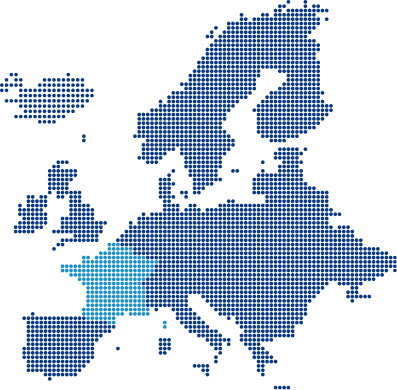
Documents you need to travel to France without a visa
These are the documents you need to visit France without a visa:
- U.S. passport valid for at least 3 months after you’ll exit the Schengen Area
- ETIAS travel authorization for France (starting 2025)
What if I do not meet the visa-free conditions for France?
If you are a U.S. citizen and you are not eligible for visa-free entry (for example you wish to work in France), you need a visa.
French National Visas are issued by the French embassy. You’ll need to contact the embassy and provide the relevant paperwork to apply.
About ETIAS France for U.S. Citizens
You can apply for ETIAS for France starting 2025. The application is 100% online— apply from the U.S. using your mobile phone, laptop, or another electronic device.
Key information about ETIAS France for U.S. citizens:
- Valid for 3 years , or until your U.S. passport expires (whichever is sooner)
- Travel to France multiple times with the same permit
- Spend up to 90 days per 180-day period in France
- Visit other Schengen countries with the same ETIAS authorization
The Benefits of ETIAS France for Americans
ETIAS will make France and the rest of the Schengen Area safer.
- Before ETIAS —only visa-required visitors undergo security screening.
- With ETIAS —all non-EU visitors undergo security screening.
This means around 1.4 potential travelers from across the world will be checked before they enter the Schengen Area, increasing safety for everyone.
Individuals who pose a potential health or security threat can be stopped from traveling to France. The information provided on the ETIAS application is cross-checked against Schengen security databases .
About France
Capital : Paris
Language : French
Area : 643,801 km²
Population : around 67 million
Timezone : UTC/GTM 1
Currency : euro (€)
U.S. Embassy in Paris, France
Address : 2 Avenue Gabriel 75008 Paris, France
Office Hours : Open from 9:00 AM to 3:00 PM
The following cities have U.S. Consulates : Bordeaux, Lyon, Marseille, Rennes, Strasbourg, Toulouse, and Nice
French representations in the United States
You do not need to contact a French embassy or consulate to apply for ETIAS, everything is done online.
If you need a visa for France or require other consular services you can contact the French embassy in Washington D.C. or over 60 other representations across the United States.
FAQs About Traveling from the United States to France
What are the requirements to travel to french overseas departments.
French overseas departments of French Guiana, Guadeloupe, Martinique, Mayotte, and Réunion are not part of the Schengen Area . ETIAS and Schengen visas are not valid for entry.
If you are planning a trip to one of these overseas departments, you should check the entry requirements based on your nationality. You will either be visa-exempt or need a visa.
Are there direct flights from the United States to Paris?
Yes, there are several options if you want to fly directly from the USA to Paris. These include flights from New York, Los Angeles, Chicago and San Francisco.
Flights from North America land at Paris Charles de Gaulle Airport (CDG).
Your ETIAS will be verified when your passport is scanned by French border officials on arrival at the airport.
What documents do I need to travel to France from the United States of America?
To travel to France as a U.S. citizen, you need a passport valid for at least 3 months after you’ll exit the Schengen Area.
For example, if you’ll leave Europe on August 1, your U.S. passport must be valid until at least November 1.
If you’re eligible for visa-free travel, you do not need additional documentation. From 2025, you’ll need ETIAS linked to your passport .
If you need a visa for your trip, you must carry your valid visa together with your passport.
Which countries near France can I visit with ETIAS?
U.S. citizens can visit any of the countries in the Schengen Area with ETIAS . The Schengen Area includes Germany , Italy, and Spain, 3 of the countries that border France.
You do not need a separate ETIAS for each European country you visit. ETIAS is valid across the Schengen Area—there are no internal border checkpoints.

Introducing France
- About France
- Images of France
- History, language & culture
- Weather & geography
- Doing business & staying in touch
Plan your trip
- Travel to France
- Where to stay
While you’re there
- Things to see & do
- Shopping & nightlife
- Food & drink
- Getting around
Before you go
- Passport & visa
- Public Holidays
- Money & duty free
Book your flights
- Aix en Provence
- Bastia Poretta Airport
- Bordeaux Airport
- Grenoble-Isère Airport
- Lille Airport
- Lyon-Saint Exupéry Airport
- Marseille Provence Airport
- Nantes Atlantique Airport
- Nice Côte d’Azur Airport
- Paris Charles de Gaulle Airport
- Paris-Orly Airport
- Strasbourg International Airport
- Toulouse-Blagnac Airport
Ski Resorts
- Alpe d’Huez
- Les Deux Alpes
- Les Menuires
- Montgenèvre
- Morzine-Avoriaz
- Pas de la Casa
- Peisey-Vallandry
- Serre Chevalier
- Val Thorens
- Val d’Isère
- Antibes and Juan les Pins beaches
- Arcachon beaches
- Bandol beaches
- Biarritz beaches
- Cannes beaches
- Corsica beaches
- Deauville beaches
- Dinard beaches
- Hyères beaches
- Ile de Ré beaches
- La Grande Motte beaches
- Le Lavandou beaches
- Les Sables d’Olonne beaches
- Nice beaches
- St Malo beaches
- St Raphael beaches
- St Tropez beaches

Cruise Locations
- La Rochelle
- Villefranche
France Visa and Passport Requirements
EU nationals : You are not required to show a passport or national ID card when entering France. However, transport providers like airlines, train operators and ferry companies will require you to show your passport or ID card to prove your identity.
Non-EU nationals : To enter France, you must have a valid passport issued within the past ten years and with at least three or six months left (depending on your nationality). You must also have a return ticket and sufficient funds for the length of stay.
France is a Schengen country, but beware that EU members such as Cyprus and Ireland are not part of the Schengen area, so a passport or ID card is required if travelling to/from these countries.
Passport Note
From November 2024, the Entry/Exit System (EES) will register all non-EU/EEA/Swiss nationals at all border crossings of the Schengen Area.
EU nationals : You don't need a visa for France if the stay is less than 90 day. Those who plan to stay longer will need a residence permit.
Non-EU nationals : Nationals mentioned in the chart above (Americans, Australians, British and Canadians) can travel to France, and any other Schengen countries, without a visa for up to 90 days in any 180-day period. This applies if you travel as a tourist, to visit family or friends, to attend business meetings, cultural or sports events. For other purposes, you need to check with the embassy, high commission or consulate of France in your home country on what type of visa and/or work permit you may need.
The complete list of countries and territories whose nationals can visit France and any other Schengen countries for up to 90 days in a 180-day period are as follows: Albania, Antigua and Barbuda, Argentina, Australia, Bahamas, Barbados, Bosnia and Herzegovina, Brazil, Brunei, Canada, Chile, Colombia, Costa Rica, Dominica, El Salvador, Georgia, Grenada, Guatemala, Honduras, Hong Kong*, Israel, Japan, Kiribati, Kosovo, Liechtenstein, Macao*, Malaysia, Marshal Islands, Mauritius, Mexico, Micronesia, Moldova, Montenegro, New Zealand, Nicaragua, North Macedonia, Palau, Panama, Paraguay, Peru, Saint Kitts and Nevis, Saint Lucia, Saint Vincent and the Grenadines, Samoa, Serbia*, Seychelles, Singapore, Solomon Islands, South Korea, Switzerland, Taiwan*,Timor-Leste, Tonga, Trinidad and Tobago, Tuvalu, Ukraine, United Arab Emirates, United Kingdom, United States of America, Uruguay, Vanuatu* and Venezuela.
• Hong Kong and Macao: holders of SAR passports do not need a visa. • Taiwan: holders of passports issued by Taiwan which include an identity card number do not need a visa. • Serbia: holders of biometric passports do not need a visa, excluding holders of passports issued by the Serbian Coordination Directorate. • Vanuatu: holders of passports issued on or after 25 May 2015 do not need a visa at least until 5 February 2025. • Nationals from micro-states within an EU country (Andorra, Monaco, San Marino and Vatican City) also do not need a visa.
For nationals from countries not listed here, please contact the nearest embassy to check the visa requirements for France.
Types and Cost
• €90 for those who are 12 years old and above • €45 for children aged six to 11 • Free for children below six
The visa fee is waived for the following applicants: • School pupils, students, postgraduate students and accompanying teachers who undertake stays for the purpose of study or educational training. • Researchers from third countries travelling for the purpose of carrying out scientific research. • Representatives of non-profit organisations aged 25 years or less participating in seminars, conferences, sports, cultural or educational events organised by non-profit organisations. • Family members of EU/EEA (European Economic Area) citizens, falling under Directive 2004/38.
Up to 90 days in any 180-day period.
Citizens of some countries need an airport transit visa when transiting through international parts of any airports within the Schengen countries, whereas citizens of certain countries are only required a transit visa for some of the Schengen countries. If you are not from a Schengen visa exempt country, please check with a French consulate near you.
Application to
Contact the embassy, high commission or consulate.
Schengen Visas
France is a Schengen country, so the Schengen visa scheme applies.
Temporary residence
EU nationals: Will need a residence permit for more than 90 days.
Non-EU nationals: Will need a visa to stay in France for more than 90 days.
Working days
Schengen visa applications usually take 15 to 21 calendar days, but sometimes up to 45 days. Be mindful of the national holidays in France as they may affect the processing time. It is recommended to submit applications at least four weeks prior to departure.
Sufficient Funds
Schengen visa applicants must be able to provide proof of funds to cover their stay.
Extension of stay
Schengen visa holders with a visa valid for less than 90 days can only extend their visas in exceptional circumstances, such as force majeure or for humanitarian reasons.
Entry with pets
When bringing a pet from another EU country, the animal must have a microchip or tattoo, an EU pet passport and a valid rabies vaccination certificate (the vaccination must have taken place at least 21 days prior to travel). Animals from outside the EU must also have an ISO 11784/11785 compliant 15-digit microchip. Depending on whether your pet is from a high-rabies country or a rabies-controlled country, your pet either has to be vaccinated first or microchipped first. For pets from high-rabies countries, a rabies titer test also has to be administered 30 days after the vaccination. A veterinary certificate issued by an authorised veterinarian is also required when entering France with a pet from outside of the EU.
Please check with the consulate directly for the appropriate procedures.
Embassies and tourist offices
British embassy in france, french embassy in the uk, french embassy in the usa.

Related Articles

City Highlight: Paris
Even if you’ve never been to Paris, you probably have a mental image of it - such is the effect this magical city has had on the world
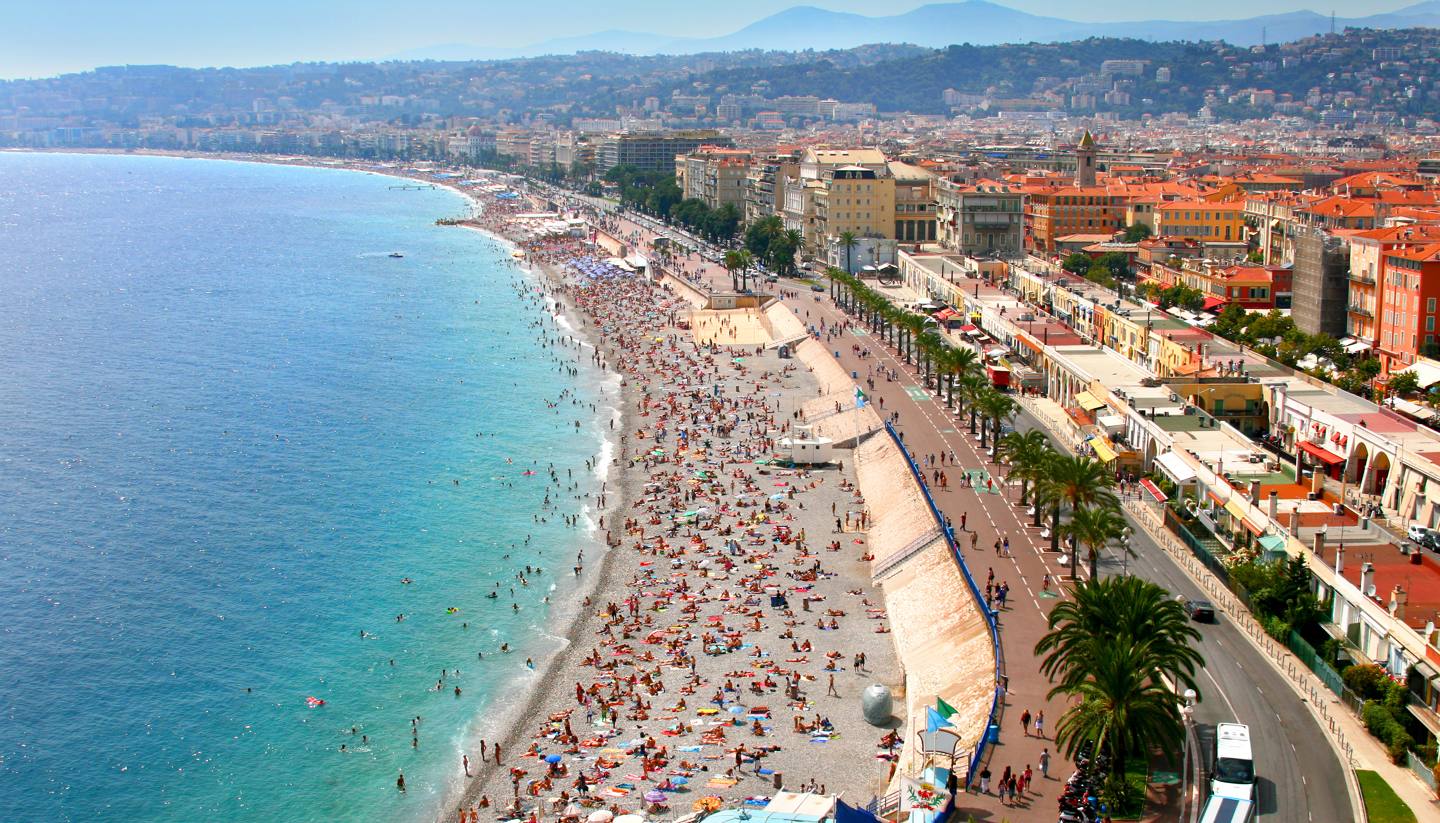
City Highlight: Nice
With its sunny weather, gorgeous green spaces and handsome Old Town, Nice makes the perfect gateway for a French Riviera beach holiday

Loire Valley celebrates 500 years of the French Renaissance
The French Renaissance was one of the great artistic movements of its time and the Loire Valley celebrates 500 years of Renaissance with many events in 2019
Book a Hotel
© Columbus Travel Media Ltd. All rights reserved 2024
France Travel Restrictions
Traveler's COVID-19 vaccination status
Traveling from the United States to France
Open for vaccinated visitors
COVID-19 testing
Not required
Not required for vaccinated visitors
Restaurants
Not required in enclosed environments and public transportation.
France entry details and exceptions
Ready to travel, find flights to france, find stays in france, explore more countries on travel restrictions map, destinations you can travel to now, dominican republic, netherlands, philippines, puerto rico, switzerland, united arab emirates, united kingdom, know when to go.
Sign up for email alerts as countries begin to open - choose the destinations you're interested in so you're in the know.
Can I travel to France from the United States?
Most visitors from the United States, regardless of vaccination status, can enter France.
Can I travel to France if I am vaccinated?
Fully vaccinated visitors from the United States can enter France without restrictions.
Can I travel to France without being vaccinated?
Unvaccinated visitors from the United States can enter France without restrictions.
Do I need a COVID test to enter France?
Visitors from the United States are not required to present a negative COVID-19 PCR test or antigen result upon entering France.
Can I travel to France without quarantine?
Travelers from the United States are not required to quarantine.
Do I need to wear a mask in France?
Mask usage in France is not required in enclosed environments and public transportation.
Are the restaurants and bars open in France?
Restaurants in France are open. Bars in France are .
- Travel Advisories |
- Contact Us |
- MyTravelGov |
Find U.S. Embassies & Consulates
Travel.state.gov, congressional liaison, special issuance agency, u.s. passports, international travel, intercountry adoption, international parental child abduction, records and authentications, popular links, travel advisories, mytravelgov, stay connected, legal resources, legal information, info for u.s. law enforcement, replace or certify documents.
Share this page:
France Travel Advisory
Travel advisory july 26, 2023, france - level 2: exercise increased caution.
Reissued with obsolete COVID-19 page links removed.
Exercise increased caution in France due to terrorism and civil unrest .
Country Summary: Terrorist groups continue plotting possible attacks in France. Terrorists may attack with little or no warning, targeting tourist locations, transportation hubs, markets/shopping malls, local government facilities, hotels, clubs, restaurants, places of worship, parks, major sporting and cultural events, educational institutions, airports, and other public areas.
Incidents such as pickpocketing and phone snatchings occur frequently and can happen anywhere, especially in crowded areas such as airports, train stations, subway and train cars, and near tourist attractions.
Peaceful demonstrations and strikes in Paris and other cities throughout France occur regularly and can disrupt transportation. On rare occasions, demonstrations have included violence and property damage and police have responded with water cannons and tear gas.
Read the country information page for additional information on travel to France.
If you decide to travel to France:
- Be aware of your surroundings when traveling to tourist locations and large crowded public venues.
- Avoid demonstrations and areas with significant police activity.
- Follow the instructions of local authorities including movement restrictions related to any ongoing police action.
- Find a safe location and shelter in place if unable to leave the vicinity of a demonstration.
- Monitor local media for breaking events and adjust your plans based on new information.
- Enroll in the Smart Traveler Enrollment Program ( STEP ) to receive Alerts and make it easier to locate you in an emergency.
- Follow the Department of State on Facebook and Twitter .
- Review the Country Security Report for France.
- Visit the CDC page for the latest Travel Health Information related to your travel.
- Prepare a contingency plan for emergency situations. Review the Traveler’s Checklist .
Travel Advisory Levels
Assistance for u.s. citizens, search for travel advisories, external link.
You are about to leave travel.state.gov for an external website that is not maintained by the U.S. Department of State.
Links to external websites are provided as a convenience and should not be construed as an endorsement by the U.S. Department of State of the views or products contained therein. If you wish to remain on travel.state.gov, click the "cancel" message.
You are about to visit:
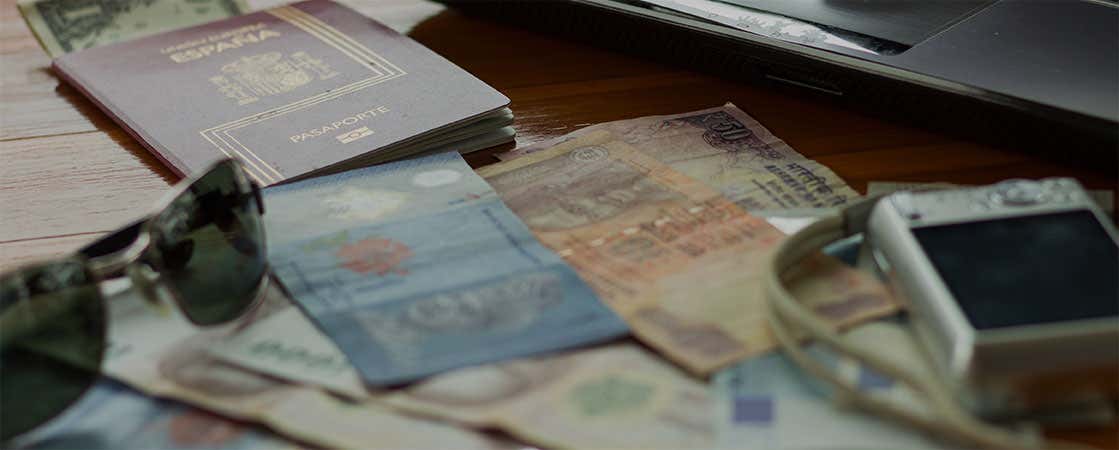
- General Information
Trip Planner
France travel advice.
Depending on your nationality , these are the necessary documents you will need to travel to France.
EU Citizens
France belongs to the European Union, specifically its Schengen Zone. If you are from another country within this zone, you can visit Paris using only your passport or I.D.
US & UK Citizens
American citizens and citizens of the United Kingdom traveling to France for less than 90 days do not need a visa. However, they will need a valid passport for at least six months beyond their stay. Immigration officers may also ask citizens to show enough funds for their stay and a return airline ticket.
Australian Citizens
Australian citizens visiting France or any other European country in the Schengen Convention (Austria, Belgium, Czech Republic, Denmark, Estonia, Finland, Germany, Greece, Hungary, Iceland, Italy, Latvia, Lithuania, Luxembourg, Malta, Netherlands, Norway, Poland, Portugal, Slovakia, Slovenia, Spain, Sweden) for less than 90 days do not require a visa . Passports need to have at least six-month validity from the planned date of return.
EU, EEA and Swiss Citizens
As citizens of the European Union and European Economic Area, you will not need a visa to enter the country.
EU Member Countries
Germany, Austria, Belgium, Bulgaria, Cyprus, Croatia, Denmark, Slovakia, Slovenia, Spain, Estonia, Finland, France, Greece, Hungary, Ireland, Italy, Latvia, Lithuania, Luxembourg, Malta, Netherlands, Poland, Portugal, Czech Republic, Romania and Sweden.
EEA Countries
Iceland, Liechtenstein and Norway.
Visa-Free Countries
The following countries do not require a visa for visits lasting less than 90 days , but require a valid passport to enter France.
Andorra, Argentina , Australia, Brazil, Brunei, Canada, Chile, Colombia , Costa Rica , Croatia, El Salvador, Guatemala , Honduras , Hong Kong , Israel, Japan, Macau , Malaysia, Mexico , Monaco, New Zealand, Nicaragua, Panama, Peru, Paraguay, Republic of Korea, San Marino, Vatican City, Switzerland, Singapore , United States, Uruguay and Venezuela .
Other Countries
For citizens of countries not previously mentioned , we recommend going to the French Embassy or visiting the French Ministry of Foreign Affairs’ website for more information.
You may also be interested in
If you are planning a trip to Paris and have questions about your chosen destination, for example the official currency, what travel documents you need to enter the country, the climate or the normal opening hours of the stores in Paris, this article will come in handy.
Health Insurance
Here are different insurance options and medical coverage you might find interesting depending on where you are traveling from.
Cookies on GOV.UK
We use some essential cookies to make this website work.
We’d like to set additional cookies to understand how you use GOV.UK, remember your settings and improve government services.
We also use cookies set by other sites to help us deliver content from their services.
You have accepted additional cookies. You can change your cookie settings at any time.
You have rejected additional cookies. You can change your cookie settings at any time.
Warnings and insurance
Before you travel.
No travel can be guaranteed safe. Read all the advice in this guide. You may also find it helpful to:
- see general advice for women travellers
- read our guide on disability and travel abroad
- see general advice for LGBT+ travellers
- read about safety for solo and independent travel
- see advice on volunteering and adventure travel abroad
Travel insurance
If you choose to travel, research your destinations and get appropriate travel insurance . Insurance should cover your itinerary, planned activities and expenses in an emergency.
About FCDO travel advice
The Foreign, Commonwealth and Development Office ( FCDO ) provides advice about the risks of travel, to help you make informed decisions. Find out more about FCDO travel advice .
Follow and contact FCDO travel on Twitter , Facebook and Instagram . You can also sign up to get email notifications when this advice is updated.
Related content
Is this page useful.
- Yes this page is useful
- No this page is not useful
Help us improve GOV.UK
Don’t include personal or financial information like your National Insurance number or credit card details.
To help us improve GOV.UK, we’d like to know more about your visit today. Please fill in this survey (opens in a new tab) .
Site under construction
- Search Please fill out this field.
- Newsletters
- Travel News
- Travel Tips
Here's What It's Like to Travel to France Right Now
Entry requirements, crowd reports, and more
Astrid was the Senior Special Projects Editor at TripSavvy.
:max_bytes(150000):strip_icc():format(webp)/Astrid-Taran_WebReady-1-cbabb21bbf364534a230dbedf5b6a785.jpg)
Entry Requirements
Digital health pass mandates, curfews and restrictions, mask enforcement, crowds and feeling on the ground, return process.
After France reopened their borders to international tourists on June 9, many travelers' long-awaited dream of a French summer getaway finally became tangible. And with this month's reopening of the Eiffel Tower, Paris seemed back in business.
Eager to finally dust off my passport and head back to one of my favorite cities in the world, I hopped on low-cost long-haul airline French Bee's inaugural flight from Newark to Paris last week and spent a few days in the City of Lights to really get a feel for how its reopening was going. Here are a few things I found helpful to know if you're planning a trip.
France is currently operating on a "stoplight system" for visitors who enter, with green, orange, and red tiers representing the risk level of different countries. Those coming from green countries can enter without restriction if vaccinated or by presenting a negative PCR or rapid test taken within 72 hours before departure. The United States has been on the green list since June 18, which meant all I needed to enter was my vaccine card issued by the U.S. Centers for Disease Control and Prevention. French Bee also provided me with a health statement that I was told to sign and present at check-in, but it was never collected. This requirement may vary depending on your airline.
Arrive at the airport early—you'll be asked to present your vaccine card or test results before you're allowed to check in to your flight. You'll also be asked to present these documents before getting your passport stamped upon arrival in France, along with a COVID-19 contact tracing form that will be given to you upon landing.
I only experienced being asked to show a health pass once, when I went out to a nightclub on a Friday night. Unaware that French nightclubs require proof of vaccination or a recent negative COVID-19 to enter, I mistakenly left my CDC card back at my hotel. Pleading with the club bouncer in very broken French, a thought occurred to me during a final moment of desperation, and I whipped out my phone to show him the Instagram post I made—in which I censored any personal information, natch—back when I received my second dose of the vaccine in late March.
"This will never work," I thought to myself. "I'll just come back tomorrow night."
Et voila! It worked!
Was it a lucky break? Perhaps. But I don't recommend doing the same. If you're planning on hitting a club, make sure to bring your CDC card and some form of identification so that they can match your name to your vaccination status. French citizens are already using a national health pass, but until stricter mandates begin next week (more on that below), your CDC card will suffice as an American tourist. Be aware that masks are optional in indoor clubs: I did not spot any worn by the revelers at Rosa Bonheur Sur Seine that evening.
About those new mandates: although I didn't experience them while I was there, French President Emmanuel Macron recently announced that in response to the Delta variant , proof of vaccination via a digital French health pass would be required for a larger list of places beginning Aug. 1. While still valid proof of vaccination, the CDC vaccine card will not be accepted as a substitution for the health pass. American travelers with a CDC card will need to bring their card with them to France, where they can have it uploaded into the app by “any willing French doctor or pharmacist (who) can enter the vaccination information in the French system, even for people who do not have a French social security number or carte vitale.”
Bar and nightclub curfews were lifted in France on June 30, along with restrictions on the number of people gathering indoors—perfect when summer nights in Paris aren't met with sunset before 10 p.m. But if you're planning on a nightcap back at your hotel after dinner, make sure to be stocked up beforehand: alcohol is still not permitted to be sold at stores after 10 p.m.
Masks were required indoors at every indoor venue I entered, including shops, cafes, and restaurants. In restaurants, most locals aren’t wearing masks once seated. Paris is particularly strict about masks being worn on the Metro, with announcements being played on a loop that anyone caught without wearing one will be fined 135 euros. On one trip, I witnessed a Parisian confront an American tourist who was wearing his mask below his nose. "I'm not vaccinated yet," the Parisian told him, "so please pull your mask up."
Astrid Taran / TripSavvy
There's no denying it: because of the entry restrictions still imposed on countries not on France's green list, the city's usual summer crowds were nowhere to be found. The line at the CityPharma pharmacy in Saint-Germain-des-Prés—the best place in the city to pick up French beauty products at lower prices than you can find in the U.S.—was non-existent. I was able to snap up a ticket to the Paris Catacombs just by walking up to the counter, and inside, only one other small family joined me. Spooky—in a good way. I still needed bookings to get a seat at some of the hottest tables in town, but surprisingly, I was even able to snag last-minute cancellations at favorites like Le Chardenoux and Le Saint Sebastian . Except for being in Paris on the afternoon of the Tour de France, it certainly didn't feel like I was in Europe during the peak summer travel season.
One very noticeable element of my trip was the sheer amount of American accents I heard. I sat next to an American couple at dinner at Le Fouquet's and overheard many of my fellow countrymen and women speaking to each other in English on the streets and in cafes. The usual British accents from tourists hopping over to Paris from the United Kingdom were nowhere to be found due to the U.K.'s current status on France's orange list. The only other non-French accents I heard during my stay were German tourists, who have also begun trickling into the country for the summer holiday.
Additionally, I found French hospitality towards American visitors to be overwhelmingly warm. "We're happy to have visitors back in Paris," one waitress at a cafe told me with a smile. When learning that I'm from New York, several Parisians expressed frustration at the lack of travel reciprocity from the U.S., as French citizens are still not permitted to enter the country.
Perhaps the only stressful part of my visit to Paris was my return home. All U.S. citizens must present a negative COVID-19 test before boarding their flight back; similar to presenting your vaccination status or test results before boarding your flight to France, you won't be able to check in to your flight home without having these results in hand. At Paris-Orly, I initially found it difficult to find the COVID-19 testing site, and once there, the instructions on the kiosk were difficult to understand for a non-French speaker.
The worst part? These tests are free for French citizens, but as of July 7, tourists must cough up a whopping 49 euro for a PCR test and 29 euro for a rapid antigen test. I was charged for both of them.
After about an hour of sweating, I received my test results, which were entirely in French. The kind gate attendant helped me translate the instructions to access them, and I was finally allowed to check in to my flight home.
I was sad to go—my Parisian getaway was magical on every level. The city appeared to be taking all of the correct precautions while easing restrictions enough to really feel like itself again. With perfect summer weather and a lack of the usual throngs of tourists, Paris feels more authentic and charming than ever before.
Related Articles
More related articles.
France bans unvaccinated U.S. tourists: Here’s what to expect when you travel to the country

Editor's note: This story has been updated as of September 10, 2021, to reflect that France moved the U.S. back to its orange list of countries. Travelers from the U.S. are now subject to stricter entry restrictions. The author traveled to France while the country was on the orange list in June.
As of June 9, 2021, France has reopened its borders to international travelers. Those coming from the U.S. must possess proof of vaccination to the country without mandatory quarantine. As of Sept. 10, unvaccinated U.S. travelers are no longer allowed to enter with proof of a negative COVID-19 test. They are only allowed to enter France for essential reasons as the U.S. has been placed back on France's orange list (more on that below).
I'm a huge fan of France and was ecstatic to hear the reopening news. Naturally, I hopped on one of the first flights to Paris (CDG) that arrived just hours after the new regulations went into effect.
Here, I'll give you a look at my experience entering France under the new coronavirus entry restrictions.
I'll start with a quick overview of what Americans need to bring for entry to France and then discuss my travel experience, from checking in at New York-JFK to clearing customs at Paris (CDG) .
Let's get started!
Overview of France's entry requirements (and what to bring)

France implemented a "stoplight" system for tourists entering the country back in June. There are three different colors: green, orange and red. The U.S. is now back on the orange list of countries due to rising coronavirus cases.
Requirements for entering France from the U.S. and other orange countries
You can only enter France from an orange country if you're vaccinated and sign a sworn declaration that you have no symptoms of COVID-19. Here's a look at the vaccine requirements:
- Proof of your vaccination — the following vaccines are accepted:
- AstraZeneca
- Johnson & Johnson
Regardless of where you depart, you must wait a set amount of time after your COVID-19 vaccine in order to enter France. The wait time depends on which vaccine you received:
- Two weeks after the second injection for two injection vaccines (Pfizer, Moderna, AstraZeneca)
- Four weeks after the injection for single injection vaccines (Johnson & Johnson)
- Seven days after injection for vaccines administered to people who have already had COVID-19, only one dose required
Unvaccinated travelers from orange countries are no longer allowed to visit France for non-essential travel. Those with pressing reasons for travel must provide a negative PCR or antigen test taken within 72 and 48 hours of boarding your flight, respectively. Additionally, self-isolation for seven days is mandatory.
Unvaccinated travelers from "green" countries are still allowed to enter France but are subject to test requirements. This includes Canada, the Schengen Area and others.
Note that a digital health pass is now required for many activities in France, including dining at restaurants and cafes. This pass proves that a traveler is fully vaccinated or possesses a recent negative COVID test. Check out TPG's full guide to obtaining a French health pass for more information.
Related: What you need to know about COVID-19 vaccines in the US
My experience flying Delta to Paris
Every trip from the U.S. to France starts with a flight across the Atlantic. I chose to fly Delta Air Lines from New York-JFK to Paris (CDG). Here's a quick look at my check-in and in-flight experience.
When I traveled to France, vaccinated travelers were still required to get a pre-departure COVID-19 test. I went to a CVS Minute Clinic in Manhattan roughly 36 hours prior to departing to get a COVID-19 antigen test. This is referred to as a "rapid test" because it provides results within 20 mins of testing. My test came back negative, but I wasn't surprised as I've been vaccinated against COVID-19 since early March.
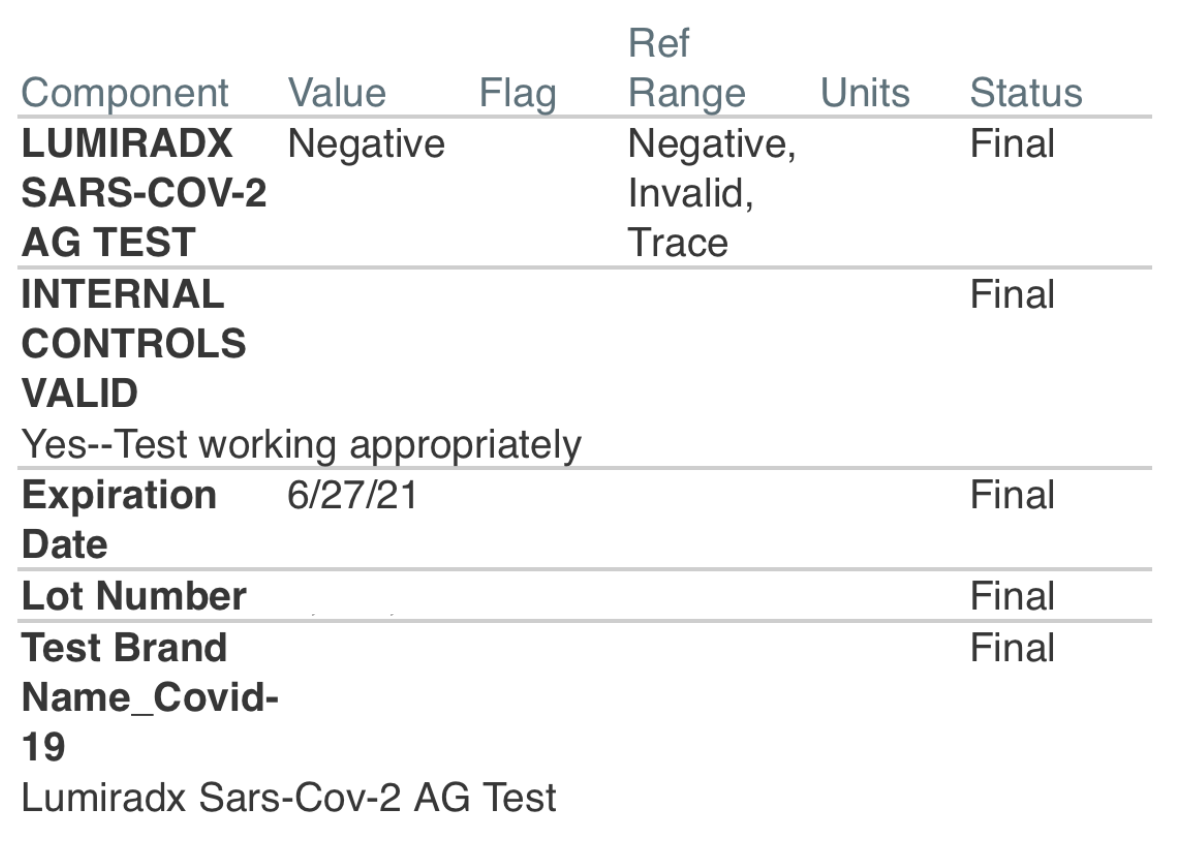
Now for a bit of worry. I attempted to check in to my flight 24-hours before departure, as usual. The Delta app stated that I must have a PCR test that was less than 72 hours old in order to fly to France and it didn't mention an antigen test. While concerning, I chalked this up to outdated app copy, but I was a bit worried as there was no place to get a PCR test in time for my flight.
Again, this wouldn't have been an issue if I traveled under the current requirements for vaccinated travelers.
The next day, I took a Lyft from my home in Queens to JFK airport. I was booked in Delta Main Cabin but used Delta SkyMiles to upgrade my ticket to Delta One , so I used the SkyPriority lane at check-in to get my boarding pass and check a bag.
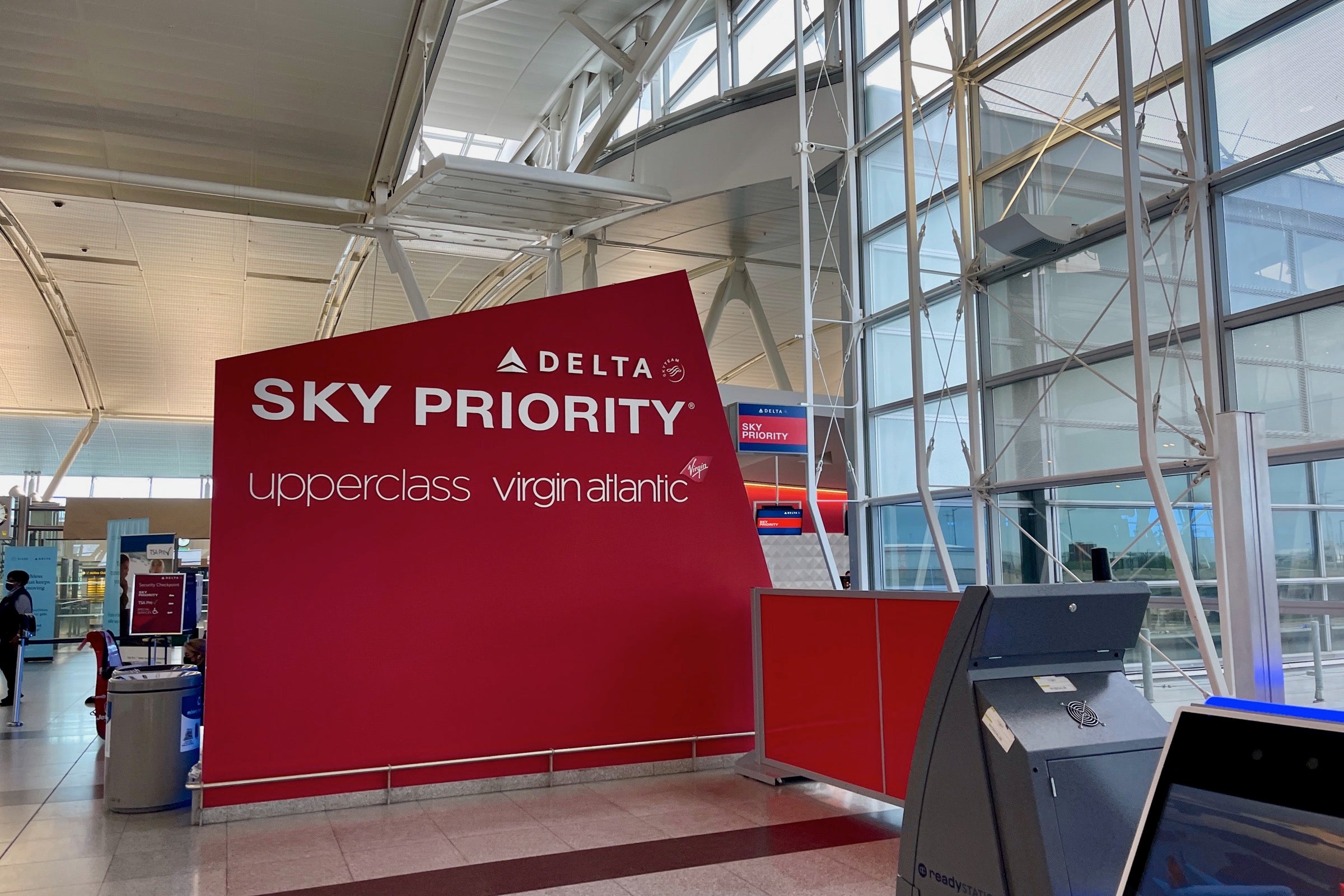
The process was smooth. The woman at the check-in counter asked if I had a PCR test that was less than 72 hours old. I told her I had an antigen test less than 48 hours old. She checked something on the computer, took my passport and then asked to see my antigen test and COVID-19 vaccine card. She confirmed everything was correct and I was on my way.
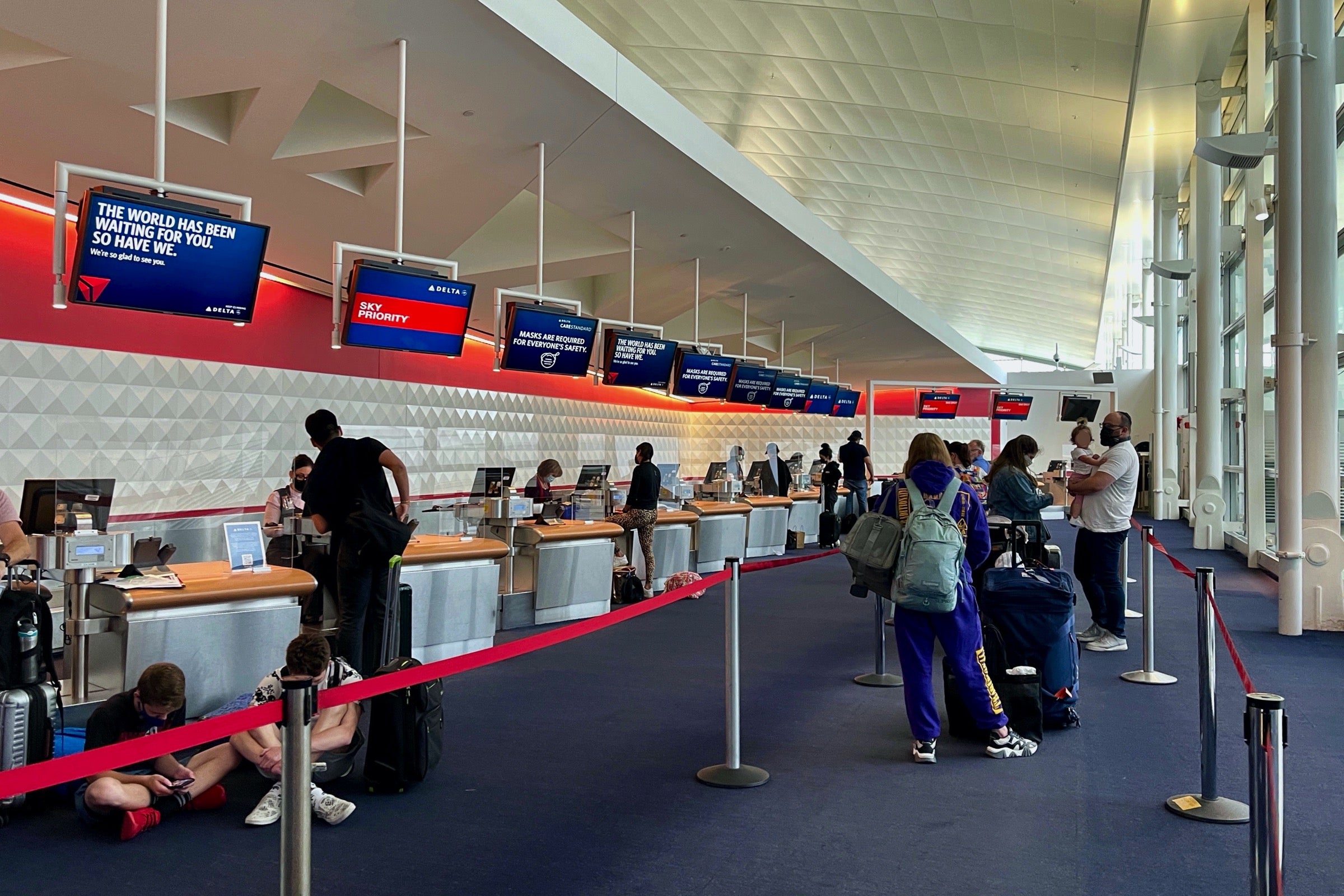
After this, I went to the American Express Centurion Lounge and waited for my flight.
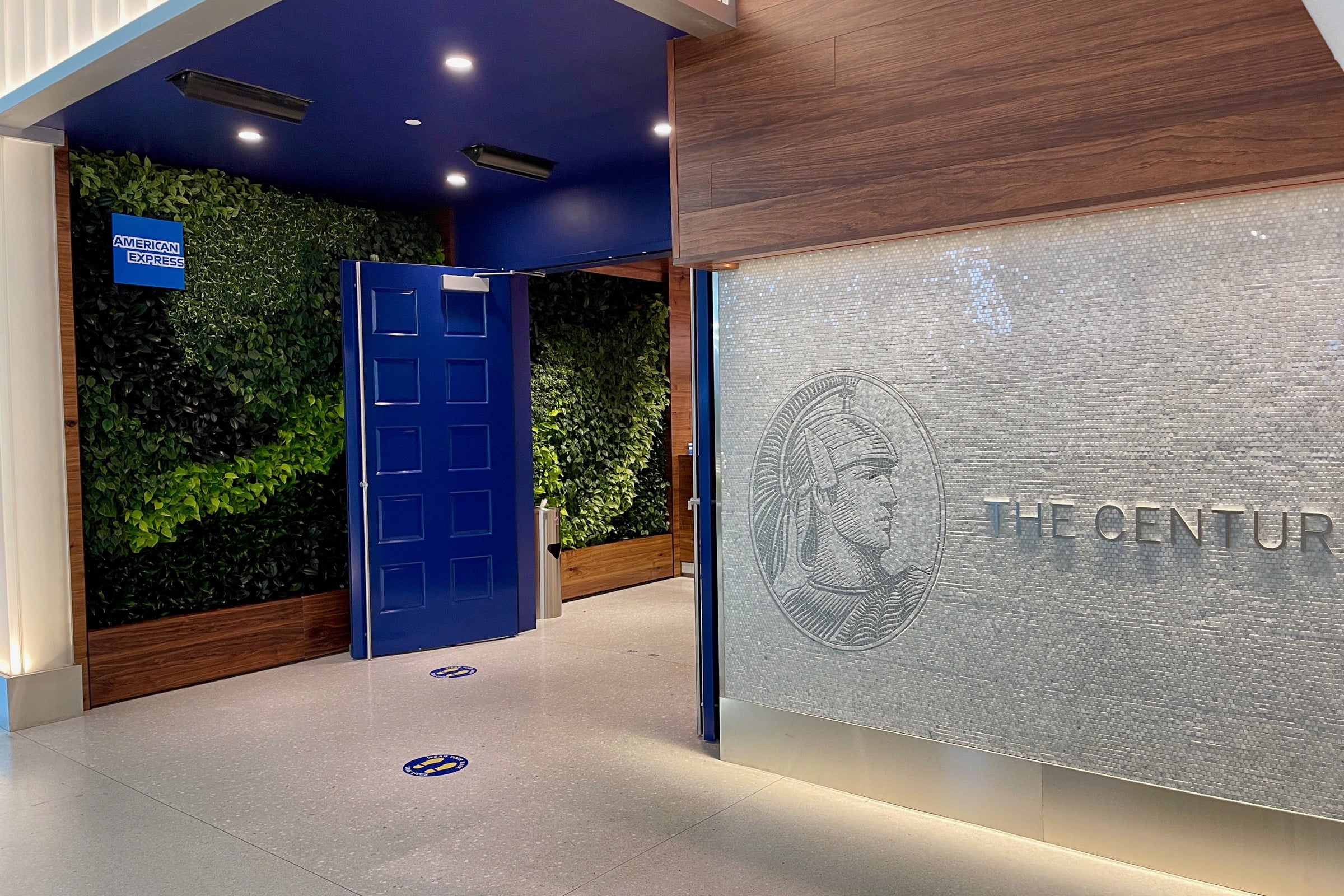
When it was time to board, I walked to my gate and boarded using Delta's touchless, facial-recognition-powered boarding process . No one at the gate asked about my COVID-19 test.
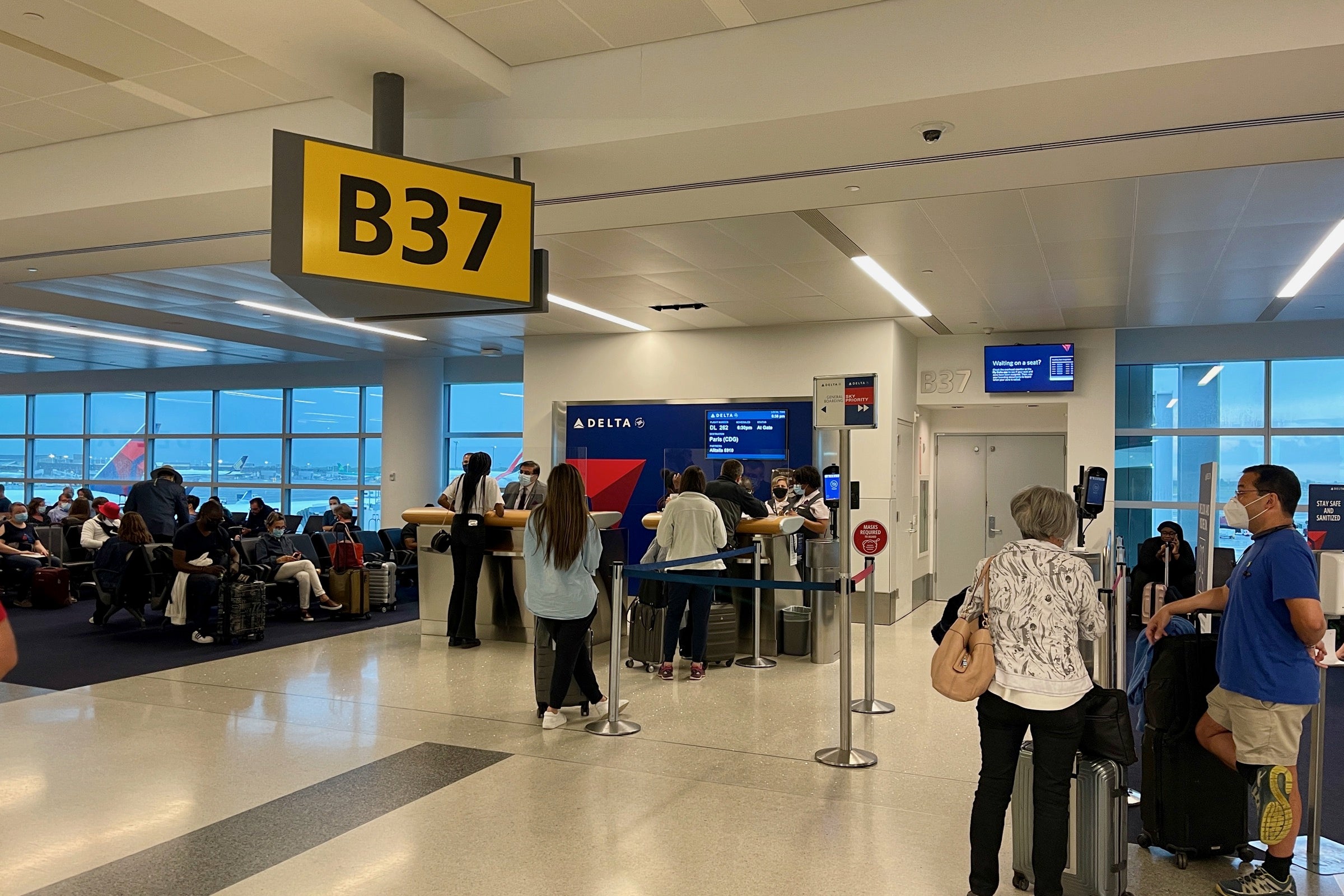
The flight was remarkably packed for a mid-pandemic transatlantic flight. Delta One was almost full and there were many groups of families in the economy cabin. You could sense the excitement in the air.
The flight mostly went on as normal with food and drink service. Plus, the Delta One Suites on the airline's A330-900neo were excellent for working and catching a few hours of sleep en route to Paris.
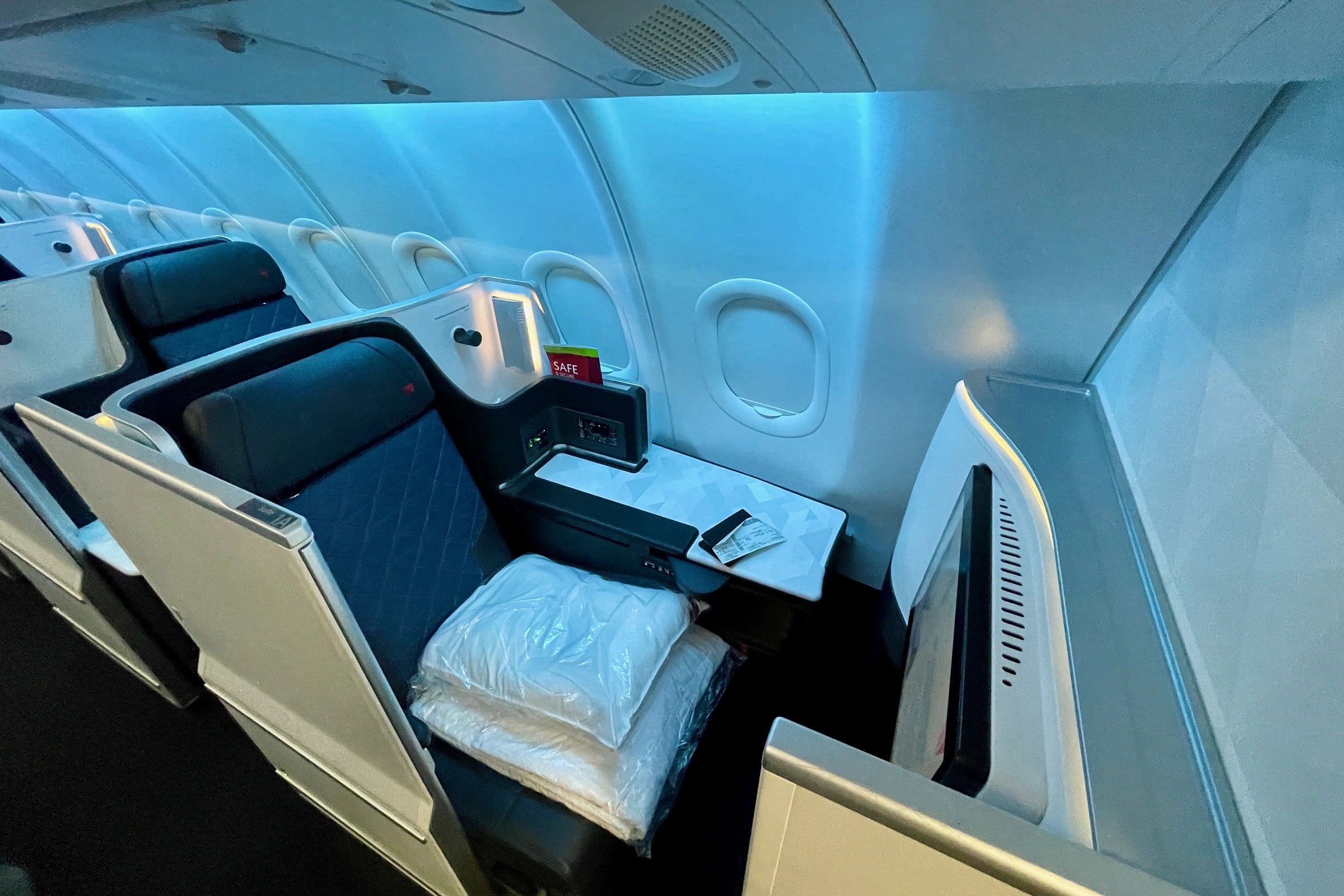
Shortly before arrival, we were given a sworn health declaration to sign and a contact tracing form. The health declaration form would be collected at the border while the flight attendants picked up our contact tracing form before we deplaned.
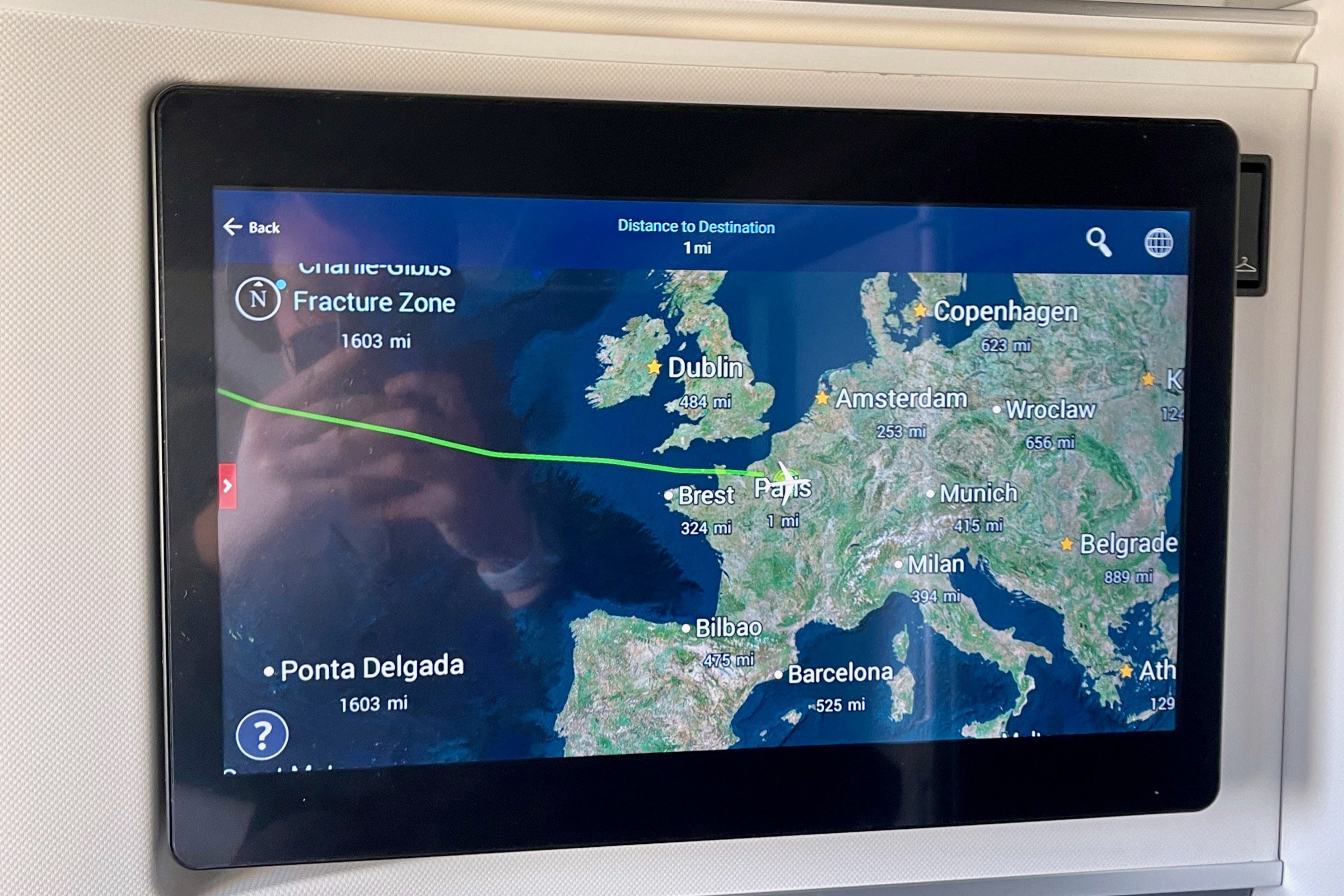
The sworn declaration form may not actually be necessary. It laid out old entry rules (mandatory PCR test, seven-day quarantine) and asked you to sign a note saying you have no COVID-19 symptoms and will obey the quarantine. I signed, but border control never asked for my form.
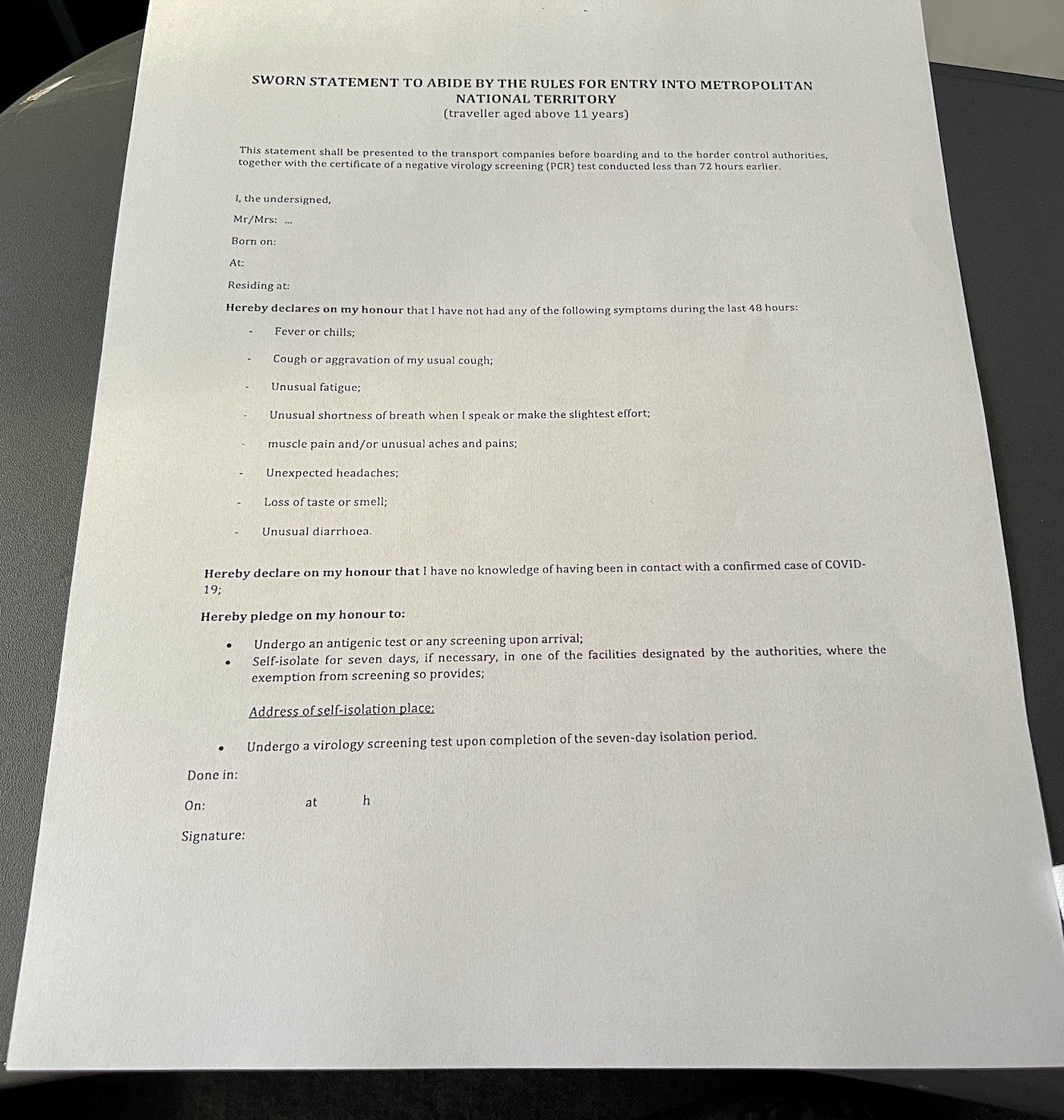
The contact-tracing form was very straightforward too. It just asked for simple information like your flight number, hotel address and other basics.
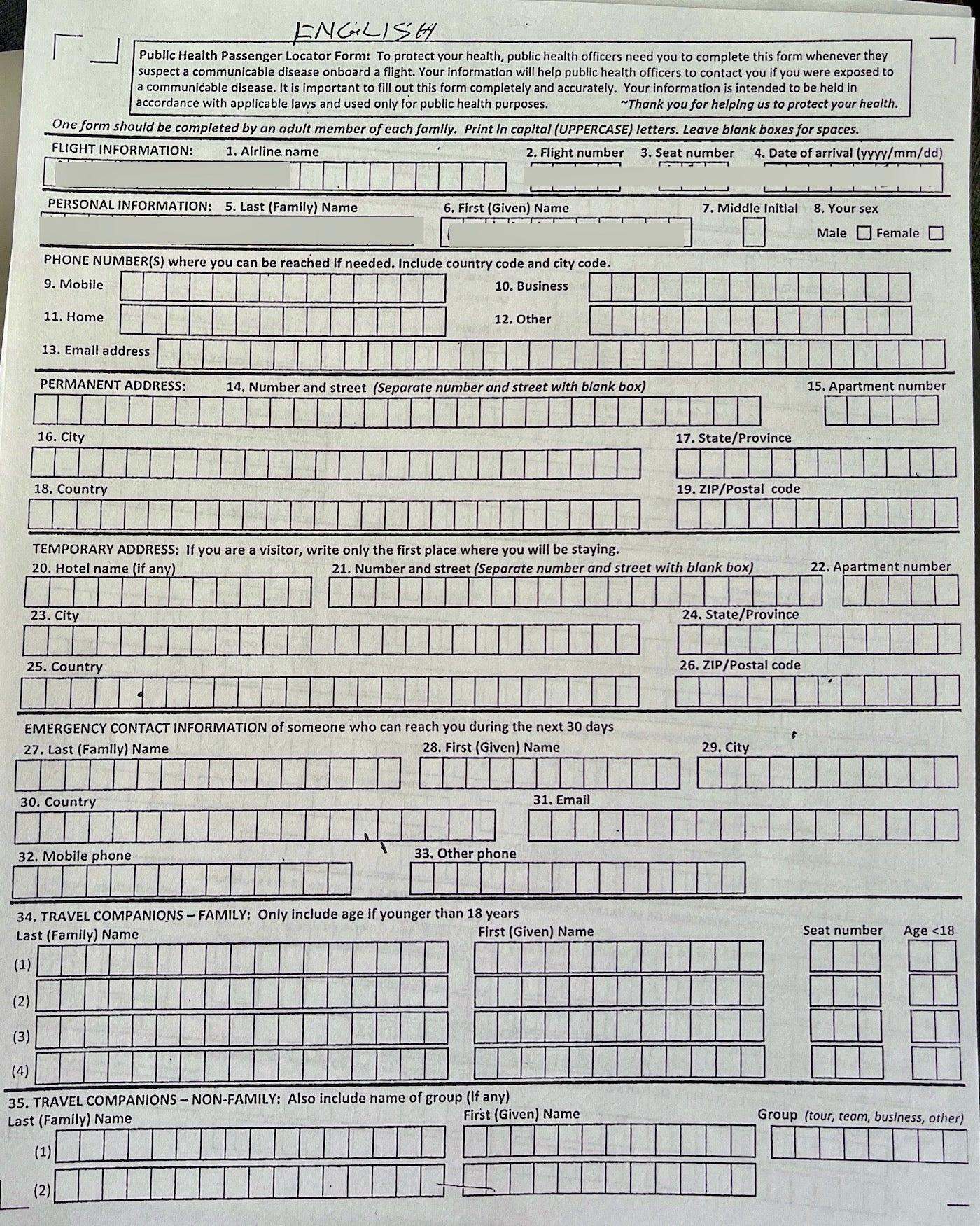
Related: Delta becomes first major carrier to launch contact tracing initiative
Experience at the French border
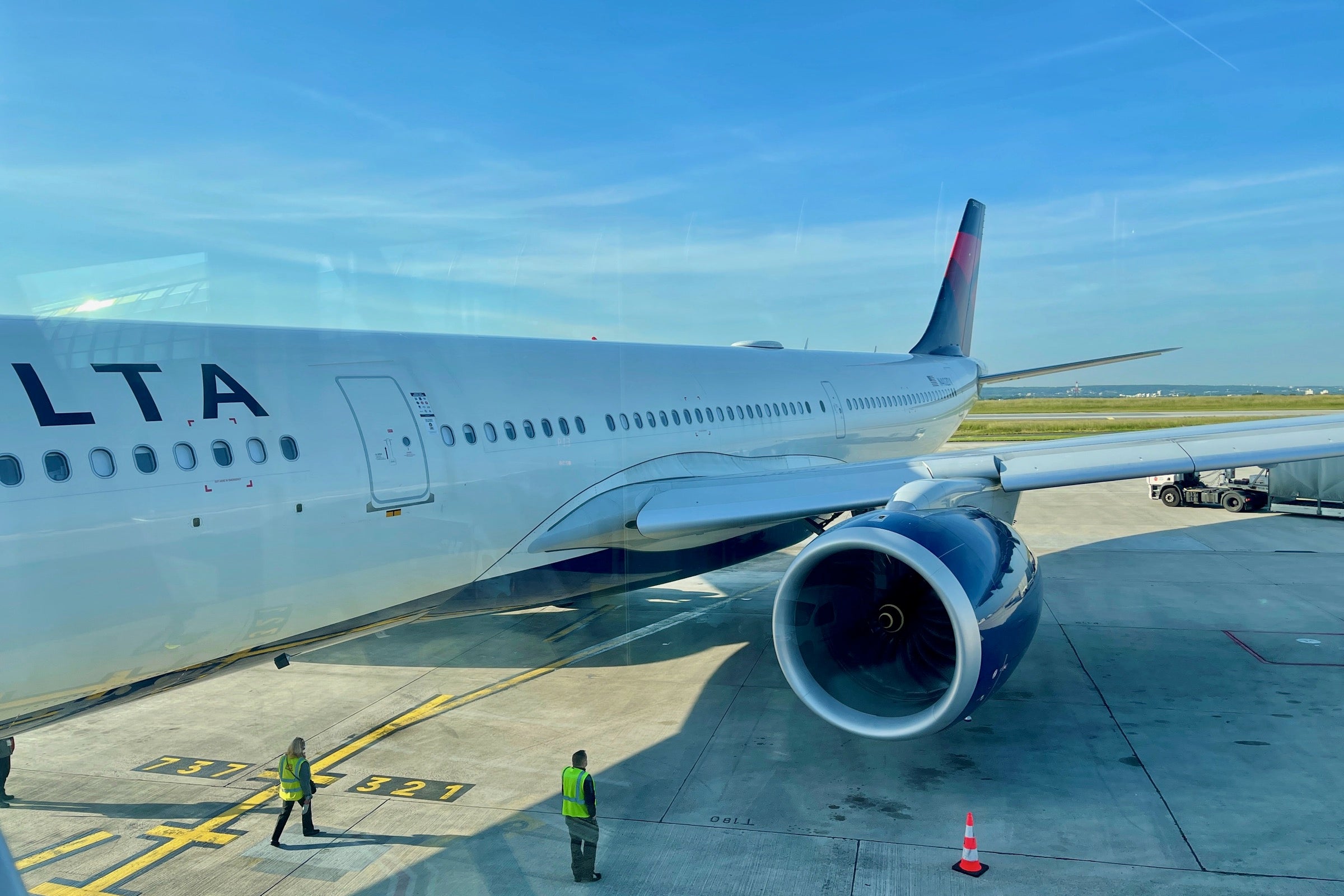
I was one of the first off the plane in Paris (CDG) after landing since I was in the first row of Delta One. I walked through a series of hallways until I reached the border control area, where three immigration desks were open. There was already a short line since a couple of other flights had come in at the same time as ours.

It only took 10 minutes for me to get to the front of the line. Even though I have a European passport , I opted to use my U.S. passport to enter France, so I could better report on my experience in this article.
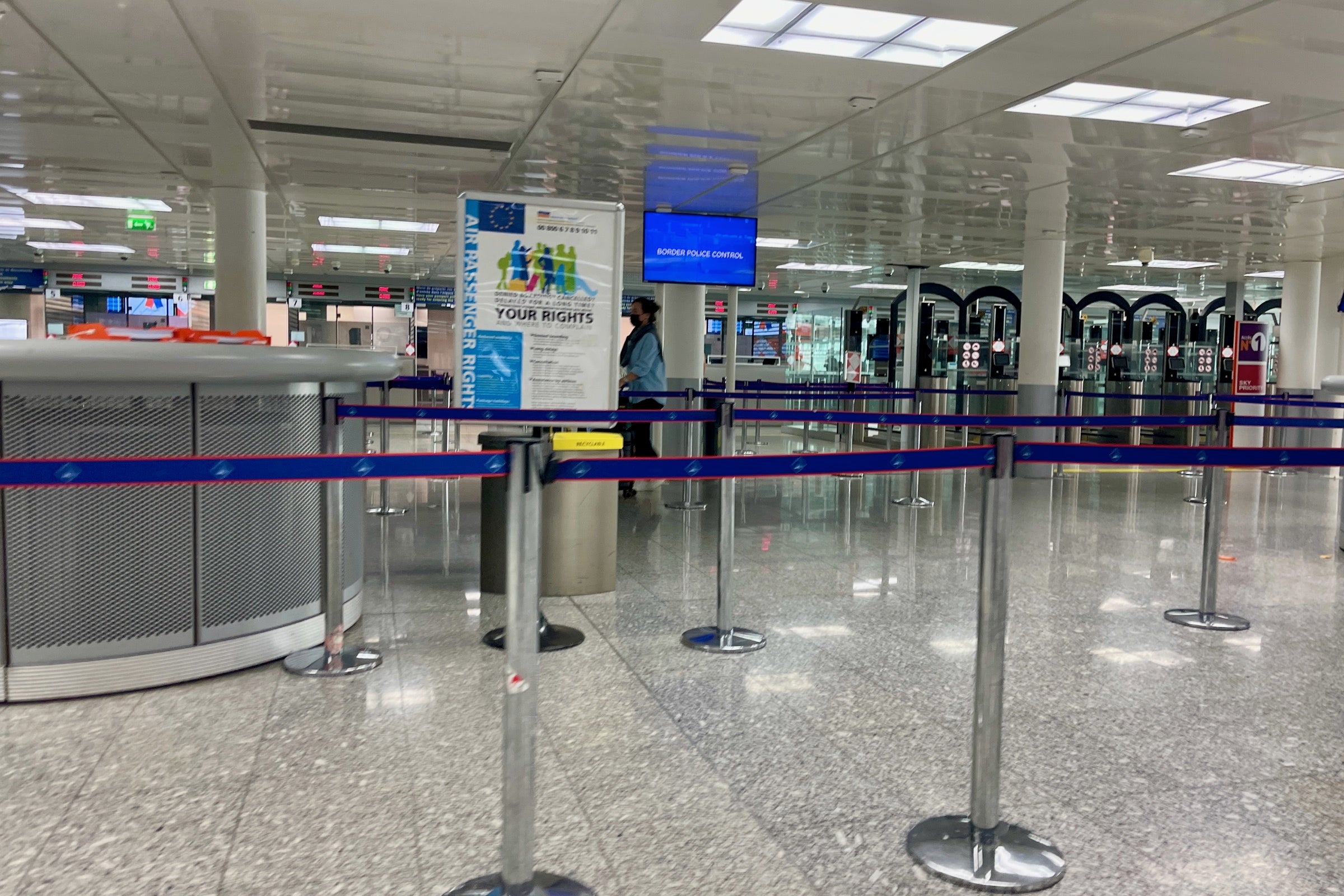
Thankfully, it was a seamless experience.
I handed the border control agent my passport, CDC-issued COVID-19 vaccine card , sworn declaration and my phone that displayed my negative test results. She looked at the documents, handed me back my sworn declaration and stamped my passport. And that was it: I was in the country.
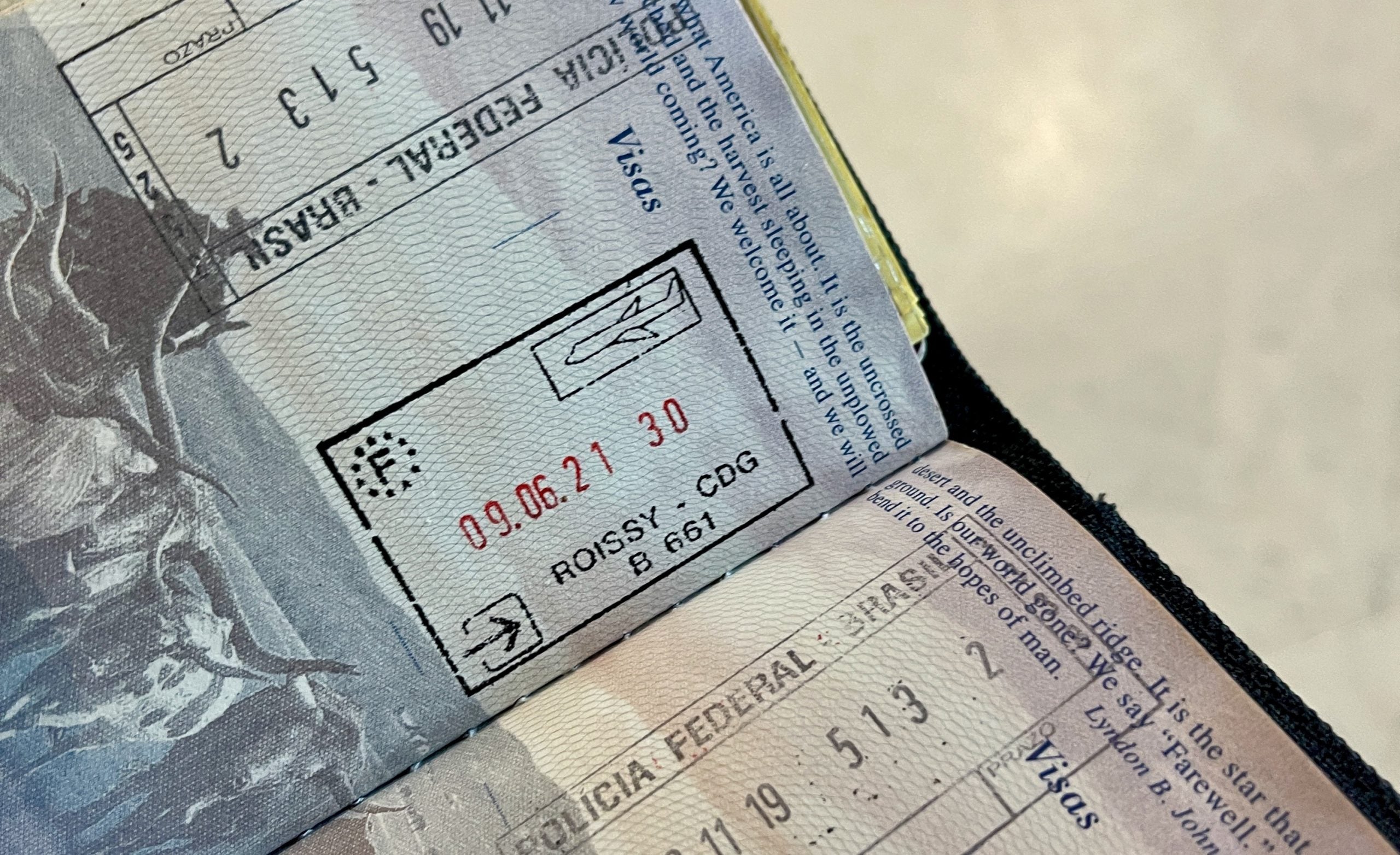
This was in stark contrast to Iceland , where I waited for border control agents to discuss whether or not I should be allowed in. Here, there was barely any communication. The friendly border agent just checked my documents and waved me through.
After this, I took a deep breath of relief, collected my bag and requested an Uber to my hotel in Paris. Trust me, the excitement set in quickly.
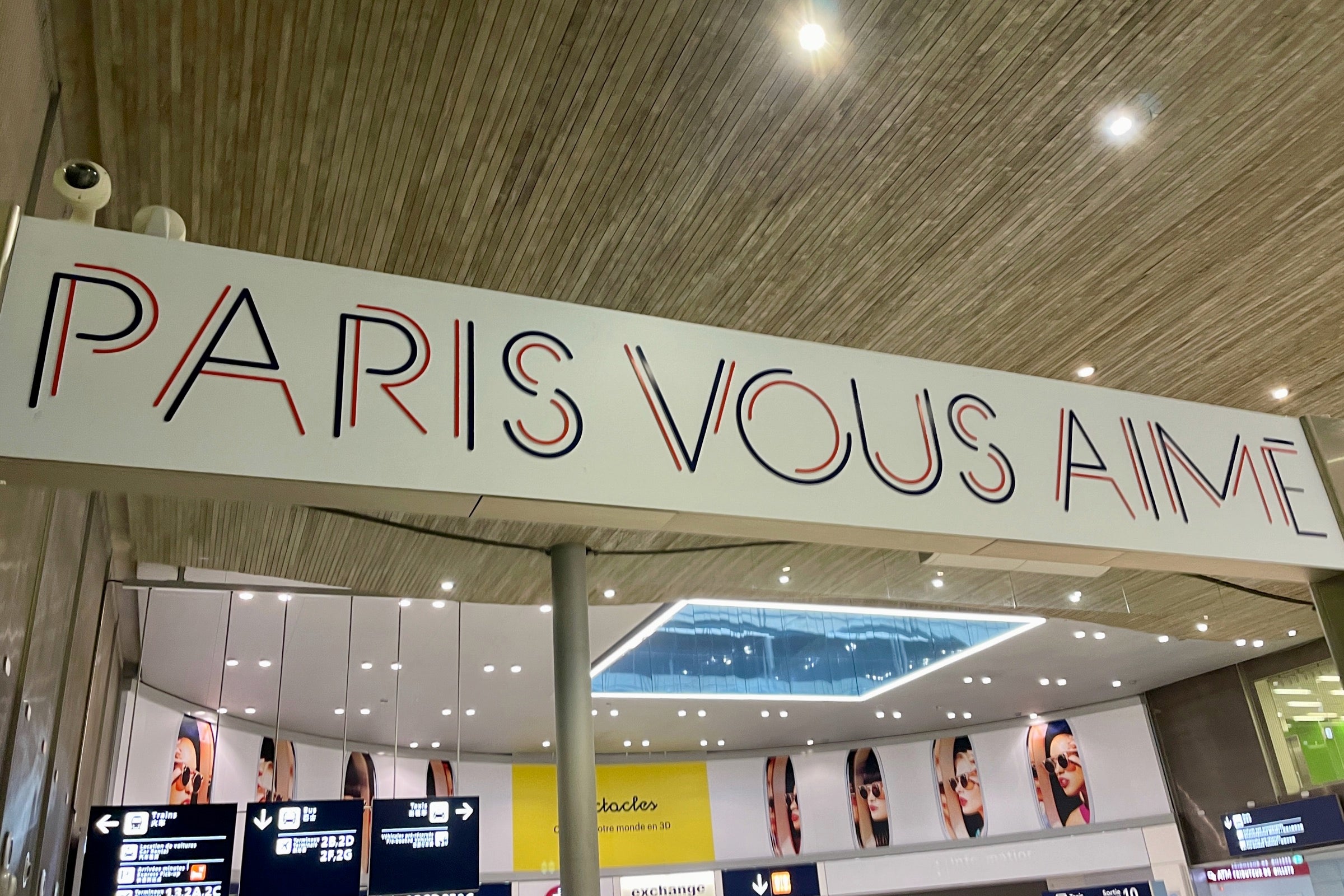
Related: When will international travel return? A country-by-country guide to coronavirus recovery
Checking into my hotel
Also, unlike Iceland, checking into my first hotel in Paris was no different than pre-pandemic times. I was not asked for proof of vaccination or other paperwork, though this may be different now that a health pass is required for many activities. All I had to do was give the front desk clerk my passport and credit card.

Funny enough, another American was checking in after me. I could tell the hotel staff was equally as excited about today's reopening. The front desk clerk happily told us we picked the perfect day to visit, as all restaurants are reopening for indoor dining.
Related: 15 things to see and do on your first trip to Paris
Bottom line
Traveling from the U.S. to France is possible under relaxed border rules, and it's remarkably easy to do. Just wait long enough post-vaccine and you should be good to go.
Because of this simplicity and all that France has to offer, I think we'll see American tourism to France continue to rebound through the end of the year. I highly recommend you make the trip too — especially now that nightly curfew and other restrictions are lifted.
Feature photo by Nikada/Getty Images

IMAGES
COMMENTS
When in France, please carry a photocopy of your passport separately from your passport. The copy will facilitate issuance of a replacement ($75 fee for adults, $85 for children). The American Embassy in Paris is at 2, avenue Gabriel, tel. 01 43 12 22 22. The Passport Section is nearby at 4, avenue Gabriel (open 9a.m.-noon, Monday- Friday).
When traveling to France, please note that the Government of France does NOT recognize the 12-page U.S. emergency passport, issued by U.S. embassies and consulates overseas, as a valid travel document for visa-free travel, and, if traveling on this emergency passport, you may be refused boarding and/or entry to France by immigration officials.
Call us in Washington, D.C. at 1-888-407-4747 (toll-free in the United States and Canada) or 1-202-501-4444 (from all other countries) from 8:00 a.m. to 8:00 p.m., Eastern Standard Time, Monday through Friday (except U.S. federal holidays). See the State Department's travel website for the Worldwide Caution and Travel Advisories.
US citizens do not need a visa to travel to France for up to 90 days. American passport holders can go to France for tourism, business, or transit visa-free. From 2025, US citizens will need to register with ETIAS to travel to France.ETIAS is not a visa, it is a travel authorisation for visa-exempt non-EU citizens, including Americans.
In summary: Yes. France passport requirements state that you must have a U.S. passport that will remain valid for at least three months after your travel dates and contains at least one blank page ...
September 10 update on entry requirements for U.S. residents. The French Government announced today that the United States has been placed on the Orange List* (or Amber list) of countries, following the EU's removal of the USA from the so-called green or safe list. The measure takes effect on Sunday, September 12, 2021.
France follows Schengen area rules. Your passport must: have a 'date of issue' less than 10 years before the date you arrive - if you renewed your passport before 1 October 2018, it may have ...
Studying in France: Campus France; French Ministry of Education: C.I.E.P. Official website of the French Government; Official website for tourism in France (Atout France) Business France: The national agency supporting the international development of the French economy; French Customs: Trouble-free travel guide, Dec. 2016 (.pdf, Douane.gouv.fr)
Upon your arrival in France, you will be subject to administrative obligations to transform your visa into a regular residence permit. These formalities will also allow you to access the services and benefits provided by the French administration. They differ depending on the visa issued to you. Long-stay visa with the obligation to apply for a ...
In Europe's Schengen area, your passport must be valid for at least six months at the time of your entry. At present, the Schengen area includes most European Union (EU) countries, except for Cyprus and Ireland. If you are transiting through Canada or the United Kingdom (UK) enroute to the Schengen area: your passport must be valid for at least six months, even though Canada and the UK do not ...
1. a valid passport ( (still valid 3 months after your expected return from France), 2. a return plane ticket (for a short stay only), 3. means of support during the stay (cash, credit cards, traveler cheques…) 4. accommodation reservations or, for some visa holders only, an "attestation d'accueil". Last modified on 20/05/2013.
You must complete all of the following conditions when crossing the border: Have a passport (or other travel document) issued for less than 10 years and valid for at least 3 months longer than ...
What about non-EU nationals? To enter France, nationals of countries outside the EU and Schengen Area will need a passport valid for at least three months after their intended date of departure, along with proof of insurance, evidence of an onward travel ticket and accommodation (or sufficient funds to pay for these), and a visa if required.
The application is 100% online— apply from the U.S. using your mobile phone, laptop, or another electronic device. Key information about ETIAS France for U.S. citizens: Valid for 3 years, or until your U.S. passport expires (whichever is sooner) Travel to France multiple times with the same permit. Spend up to 90 days per 180-day period in ...
This system was removed on 1 August 2022. Therefore, the rules previously in place for travellers to France no longer apply: Travellers no longer need to present a sworn declaration that they are not infected with COVID-19 and pledge to take an antigen test or biological exam upon arrival in France. This also applies to travel between mainland ...
Non-EU nationals: Nationals mentioned in the chart above (Americans, Australians, British and Canadians) can travel to France, and any other Schengen countries, without a visa for up to 90 days in any 180-day period. This applies if you travel as a tourist, to visit family or friends, to attend business meetings, cultural or sports events.
France receives more international travelers every year than any other country in the world, and many of them are able to visit without applying for a special visa. Travelers from countries including the U.S., Canada, the U.K., Mexico, Japan, and many more are exempt from needing a visa to enter France for periods of 90 days or less; all you need is a valid passport that doesn't expire ...
The health pass is required in the following circumstances: When entering health care centers, if you come to visit a relative or if you have a scheduled procedure. When crossing a border during a trip from/to France. In some overseas French territories where the use of the health or vaccine pass has been extended.
Find continuously updated travel restrictions for France such as border, vaccination, COVID-19 testing, and quarantine requirements.
Peaceful demonstrations and strikes in Paris and other cities throughout France occur regularly and can disrupt transportation. On rare occasions, demonstrations have included violence and property damage and police have responded with water cannons and tear gas. Read the country information page for additional information on travel to France.
US & UK Citizens. American citizens and citizens of the United Kingdom traveling to France for less than 90 days do not need a visa. However, they will need a valid passport for at least six months beyond their stay. Immigration officers may also ask citizens to show enough funds for their stay and a return airline ticket.
FCDO travel advice for France. Includes safety and security, insurance, entry requirements and legal differences. ... Passports, travel and living abroad; Travel abroad; Foreign travel advice;
This site is developed by Atout France, the national tourism operator under the supervision of the Ministry of Europe and Foreign Affairs. (Update: July 2023) With more than 90 million foreign visitors recorded in 2018 (including overseas destinations), France remains the world's leading tourist (…)
Curfews and Restrictions. Bar and nightclub curfews were lifted in France on June 30, along with restrictions on the number of people gathering indoors—perfect when summer nights in Paris aren't met with sunset before 10 p.m. But if you're planning on a nightcap back at your hotel after dinner, make sure to be stocked up beforehand: alcohol ...
Overview of France's entry requirements (and what to bring) Vaccinated Americans can now visit France for tourism. (Photo by Clint Henderson/The Points Guy) France implemented a "stoplight" system for tourists entering the country back in June. There are three different colors: green, orange and red.
Your visa. You must apply for a long-stay " visitor " visa. You will be issued with a long-stay visa serving as a residence permit (VLS-TS). This visa is subject to an online validation procedure after you arrive in France. Where appropriate, a temporary long-stay visa (VLS-T) can be issued to people who are certain that they will not extend ...